#the merchant of river north
Explore tagged Tumblr posts
Text
The Merchant of Venice River North
Do I think there are parallels between The Bear and The Merchant of Venice? Yes. ✅
Are those parallels good Sydcarmy signs? Yes. ✅
Am I prepared to do a in depth analysis on those parallels to prove my point? No. ❌
Could I just say that Carmy could be Bassanio, Cicero could be Shylock, Syd could be Portia (the one who saves the day), Jessica could be Sugar, and Tiff and Frank’s wedding could be one of the 3 weddings that mark the happy ending of the story, once the debt has been condoned or deemed unplayable, and the other 2 weddings are gonna be Jess and Richie’s and of course, last but not least, the final act could be the Sydcarmy wedding, and just leave it at that? Of course I could. ✅

The merchant of Venice is about a poor guy who was willing to do anything to win the hand of his beloved’s and dragged down with him a lot of ppl in the process, even when his ❤️ was in the right place.
Moral of the fable: Love can make you do crazy things and friends (found family) are willing risking it all for.
"One half of me is yours, the other half yours - Mine own, I would say; but if mine, then yours, and so all yours."
The Merchant of Venice

I say The Bear is Austenian, and you guys say it's Shakespearean.
OK, let's go full Shakespeare then.
Here you have it. Carmy is a merchant restauranteur and also Italian, so... it fits.
#sydcarmy#the bear#the bear meta#the merchant of venice#the merchant of river north#carmy berzatto#sydney adamu#love story#shakespeare#gingerpovs#shakesperean parallels#the bear fx#carmen berzatto#the bear hulu#carmy x sydney#syd x carmen#sydcarmy meta#symbology#what matters is the people not the money
22 notes
·
View notes
Photo
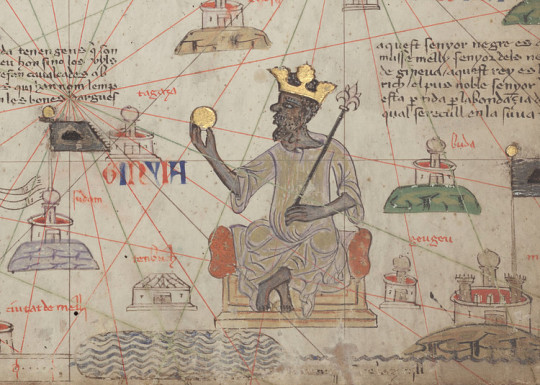
Mansa Musa I
Mansa Musa I was the ruler of the Mali Empire in West Africa from 1312 to 1337. Controlling territories rich in gold and copper, and monopolising trade between the north and interior of the continent, Mali grew extremely wealthy. Mansa Musa was said to have spent so much gold in Cairo that the value of bullion crashed by 20%.
A Muslim like his royal predecessors, Mansa Musa brought back architects and scholars from his pilgrimage to Mecca who would build mosques and universities that made such cities as Timbuktu internationally famous. Mansa Musa's 1324 stopover in Cairo, though, would spread Mali's fame even further and on to Europe where tall tales of this king's fabulous wealth in gold began to stir the interest of traders and explorers.
The Mali Empire
The Mali Empire (1240-1645), the largest and richest empire yet seen in West Africa, was founded by Sundiata Keita (aka Sunjaata, r. 1230-1255). The Mali capital was Niani, and the most important trading city was Timbuktu near the River Niger and located where major waterways and land routes converged. Immense wealth was gained from acting as a trade hub between the interior and southern coast of West Africa and North of Africa across the Sahara desert's caravan routes. Salt was a major commodity traded from the north while from the south came gold and ivory. The empire eventually included Ghana, Walata, Tadmekka, and the kingdom of Songhai and ultimately stretched all the way to the Atlantic coast. Indigenous rulers adopted Islam from their contact with Arab merchants, and the Mali Empire would thus play a significant part in the spread of Islam across West Africa. Locals, or at least urban ones, were converted, which created communities that then attracted Muslim clerics from the north, strengthening the religion's grip on the region. Local leaders would even perform pilgrimages to the Islamic holy sites like Mecca, including their greatest ever ruler, Mansa Musa.
Continue reading...
115 notes
·
View notes
Text
Okay, what should've been a quick expository line about Rook and Neve passing through another Talon's territory in Bastion sent me down a rabbit hole.
As far as I can tell from Eight Little Talons + Veilguard + DAO + what the wiki has of World of Thedas (I didn't pull it off the shelf to confirm), here's what information we DO have about which Talon Houses have territory in what parts of Antiva + some guessing on my part for the rest.
Keep in mind that a) it's guess work and I may have missed a throwaway line somewhere b) some major cities do seem to be shared territory even before the Antaam invade Antiva and c) there are spoilers for Eight Little Talons if you haven't read it.
Rough Outline of Antivan Crow Territory
(moving from North to South)
Brynnlaw (in “the North”, could be further North or South than Treviso):
Pre-Invasion: Possibly House Kortez? Emil Kortez says "The Qunari will not be satisfied with the Imperium...They have invaded Antiva before ... in Brynnlaw, there are still buildings defaced by gaatlock powder. It is a common sight in the north.” He's then told not to make it North vs South.
House Kortez is also the House approached by the Antaam to buy their way into Antiva, which would make sense for a very northern House.
Post-Invasion: It's strongly implied Caterina is going to have Lucanis kill all of House Kortez, so a different House would have had to be elevated to Fourth Talon and a different House would have to govern this territory. (Not necessarily the same House.)
Alternately, depending on how fast the Antaam moved or how weak the new House was, it's possible the Antaam hold this area
Treviso:
Pre-Invasion: House Valisti (Claudio Valisti was born in 9:08 Dragon to the Valisti dynasty, a family of merchant princes operating out of Treviso) + House Dellamorte (Lucanis’s family home).
Post Invasion: Cantori Diamond (possibly pre-existing?) + center of Antivan resistance/ reformist Crows (Viago seems to be living in the Diamond, not Salle). Rook de Riva calls Treviso "my city", but Illario implies they're new/a tourist.
Antiva City (Capital):
Pre-Invasion: Teia has somewhere there for Viago to stay (individual or House Cantori holdings?) + Zevran Arainai was purchased from a brothel there
Seleny:
Inland, unlike other Antivan cities, along a river (not the Minanter River)
Pre-Invasion: The lake to the west of Seleny, Lago di Novo, is vacation country for Antiva’s elite and thus “Every house was permitted to take contracts in this region, marking it neutral territory. Even ground.”
Theoretically Seleny could be House Nero territory if their pearl diving happens where the river meets the Bay and just Lago di Novo is neutral territory.
Unknown Location for House Nero:
Pre-Invasion: House Nero’s wealth comes from pearls, and Bolivar Nero is said to “spen[d] coin as if Rialto Bay had an infinite supply of pearls”
Could possibly be further south than Rialto or Salle or further North than Antiva City & Treviso while still technically being on Rialto Bay… placed for convenience/symmetry.
Theoretically Seleny could be House Nero territory if their pearl diving happens where the river meets the Bay and just Lago di Novo/ the general lake country is neutral territory.
Rialto:
Pre-Invasion: Mentioned to be where Teia Cantori is living most of the time, where she stables her horses and is returning to after the Talon’s meeting, etc.
Post-Invasion: If Teia is consistently helping the resistance in Treviso, either Rialto is being held by an underling or it's fallen. No indication either way.
Salle:
Pre-Invasion: Only mentioned in terms of Viago de Riva living there/returning there
Post Invasion: If Viago is consistently helping the resistance in Treviso, either Salle is being held by an underling or it's fallen. No indication either way.
Bastion:
Not mentioned in Eight Little Talons or associated with a House from WOT or one of the games.
Pre-Invasion: This could be House Balazar's territory. Dante Balizar is the one who replies to Emil Kortez saying "It is a common sight in the north" by saying “Don’t make this a competition between north and south.” He's not otherwise associated with any particular geography.
(This evidence isn’t particularly strong, but we don't have anything else.)
#antiva#antivan crows#viago de riva#andarateia cantori#teia cantori#caterina dellamorte#house de riva#house dellamorte#house cantori#house arainai#treviso#rook de riva
132 notes
·
View notes
Text
After watching a video essay on bilibili about the Jiangnan cultural topography of Mysterious Lotus Casebook, I've been thinking about how the drama engages with this cultural backdrop to explore what it means to be an outsider.
But first, what is Jiangnan?
Geographically, “Jiangnan is a geographic area in China referring to lands immediately to the south of the lower reaches of the Yangtze River, including the southern part of its delta” (from Wikipedia)
Historically, this area comprised the heart of the ancient Wu Kingdom, and its inhabitants speak the Wu Dialects to this day
Culturally, Jiangnan is associated with vibrant cities intersected by rivers and streams, prosperous merchant classes, soft-spoken people, and fine, delicate craftsmanship. It is distanced from the political centers in the north, far from the northern and southern borderlands, and is thus heavily associated in the cultural imaginary with civilian life (in contrast to courtly life).
The area in the pink circle on this map from Wikipedia is the Jiangnan that most modern Wuxia and costume dramas refer to.

Jiangnan as a cultural homeland
Jiangnan as a geographic backdrop and cultural landscape has interesting implications in MLC when it comes to understanding the cultural belonging and identities of the main characters.
Li Lianhua, Fang Duobing, Qiao Wanmian, and others in the Sigu Sect are locals to the region.
Di Feisheng is not from here (the Di Manor is in the “southwest”) and Jiao Liqiao is from here but identifies more closely with her Nanying nationality. They are both “outlanders” in the setting of the drama and in their relationship to the martial arts world.
Li Lianhua is native to this land of many rivers, and despite his wandering and rootlessness, he never really leaves his homeland. He wanders his homeland, refusing to be tied down by social relationships and public duty, but he is at home here. He is not truly rootless the way Di Feisheng is rootless: foreign to his newfound home and foreign to the home he fled from. Or the way Jiao Liqiao is rootless: foreign to the land she was born in, belonging to a nation that no longer exists.
67 notes
·
View notes
Text

CHAPTER FOUR | TSOFAS.
pairing: azriel x reader.
word count: 4,500.
author's note: we’re now deep diving into azriel’s inner monologue and surprise surprise it’s nothing but angst baby. I just think our batboy would have a strong sense of self-loathing especially at the beginning of his arc, but fear not, the idea is that his character will develop as we go along. enjoy x
♫ alone again - the weeknd. nav. series. moodboard.

The shadowsinger gravitated towards the bright lights of Velaris like a moth to an open flame.
Azriel flew high above the City of Starlight, his massive wings swallowing up the silver moon. The four market squares below him, usually packed and crowded during the day, were quiet as he glided smoothly over the colorful roofs proudly jutting up over the horizon. A few stragglers stumbled through the streets — merchants closing up shop, customers clutching last minute purchases, friends and lovers walking arm in arm, eager to return home.
Home.
That’s where Azriel should be. But these days, he wasn’t sure where home was anymore.
The shadowsinger turned his attention to the north, where the House of Wind stood proudly against the backdrop of the flat-topped mountains. Though it had been his primary residence since the beginning of his spymaster duties, the House had never really felt like home. Until recently, it had belonged to Rhysand’s family before his brother gifted it to Nesta and Cassian as a mating present. The happy couple had certainly taken to staking their claim in it long before they even knew they were mates, much to Azriel’s chagrin.
Perhaps it was for that reason alone that he found himself spending less and less time there. Azriel could never begrudge Cassian for finding happiness — the Mother knew that Nesta and his brother fought tooth and nail to get where they were now, but it didn’t mean that Azriel was immune to the pang of envy that coursed through him every time he saw them exchange a tender look or hushed whisper.
Though they tried their best to dial their public displays of affection down in his presence, it had become unbearable as of late. Mostly due to the disastrous events of last Winter Solstice.
Try as he might to avoid it, Azriel’s gaze drifted towards the south. From this vantage point, he could clearly make out the pale moonstone walls of the River House. It sat at the edge of the Sidra River and beckoned him towards the home like a beacon. He could see the training pits, the grand library, the cozy studio, and the lush garden. The fallow ground around it was soft and brown just like the eyes of the middle Archeron sister. The sister that he had been avoiding since winter.
The incident with Elain still left him with a mixture of complicated feelings. Rhysand had made his position clear on the matter, but yet the shadowsinger still hadn’t deciphered what the almost kiss meant to him. Azriel liked Elain well enough, but the truth of the matter was that they really didn’t know one another.
If he was being honest with himself, Azriel knew that he was a coward. This business with Elain and even his centuries long fixation on Mor all amounted to one thing; the shadowsinger chased after forbidden, unattainable things because it was safe. As long as there remained a barrier between him and the thing he desired the most — love, intimacy, attachment — Azriel would never really have to show anyone who he truly was. A bastard from the Steppes, drenched in blood and brutality, forever haunted by the ghosts of his past.
The savage shadowsinger that lived only to spy and kill and torture. The proverbial creature of darkness whose very name evoked fear throughout Prythian.
That’s who Azriel was. Who he would always be.
A monster incapable of love.
Azriel turned his back on the High Lord and High Lady’s property. The River House was a home — just not his.
With an expression as cold as ice, the shadowsinger flew back to the House of Wind. Azriel landed quietly at the edge of the training pit. It was nearly midnight and the twilight sky was a swirl of deep blues and bruised purples broken up with silver rays of moonlight that cascaded softly upon the red sands. He expected to find the place empty, but lurched in surprise as a dark figure stepped out into the starkissed night.
Azriel was perfectly aware that he should at least attempt to rest before his journey to the Autumn Court, but he found himself pausing underneath a hidden alcove at the edge of the pit.
Watch, his shadows whispered.
They swarmed around him in excitement as he hung back, watching in silence as the assassin danced gracefully upon the red sand. Her familiar twin blades, aptly named Dawn and Fury, slashed through the air while she flawlessly executed the eight point attack. The shadowsinger noted that her moves leaned towards the offensive. The assassin didn’t fight with his cool, calm, and calculated demeanor — no, she fought with rage and wrath and righteous fury. She fought like wildfire.
With a powerful swing, the assassin hurled her weapons at the practice target on the other side of the ring. The blades pierced the straw mannequin dead center where a heart would be. A killing blow.
Placing a hand on her hip, the assassin casually glanced at him over her shoulder, “Hasn’t anyone ever told you that it’s not polite to lurk?”
The shadowsinger frowned and stepped out into the light. Azriel was sure that he hadn’t made a single sound since his arrival, but yet she had sensed his presence all the same. His inability to prowl around the assassin perturbed him to no end.
He leveled his cool gaze across the pits, his features schooled into neutrality. “I didn’t think anyone else would be out here.”
The assassin shifted to face him and shrugged. “Couldn’t sleep.”
A sense of deja vu washed over Azriel as he glided into the sandpit. It felt like stepping into a memory from centuries ago, on the eve of an especially frosty Winter Solstice, the night they first met.
Azriel had just been appointed as the Spymaster of the Night Court by Rhysand’s father. Despite the festivities, he remained on high alert even as the moon waned above him. With the threat of war looming, he couldn’t afford to be lax in security. All but one member of the High Lord’s family were asleep and accounted for in the rooms underneath him, but the shadowsinger had known Serena long enough to clock the slightly ajar balcony door.
Usually, Azriel would let it slide. He knew that Rhysand's sister often snuck out at late hours of the night to either fly around the city or indulge in a drink or two at her favorite pleasure hall. Sometimes he even joined her himself, but with his new position in Court, those days of leniency were long gone.
Under the cover of darkness, Azriel waited for Serena’s return. He hadn’t expected a stranger to peek her head out from a hidden alcove, scanning the surroundings as she crept through the training pit.
The shadowsinger blocked the stranger’s path before she could take another step. “Who the hell are you?” were the first words Azriel ever uttered to the assassin.
She had looked at him, examining his wings and the cold expression on his face. He waited for fear only to be met with a defiant glare instead. “Who the hell are you? And why are you lurking in the shadows like some cursed creature?”
A shadow curled through his wrist as he clenched his fist. “I asked first.”
“I asked second.”
He surveyed the female for a moment, hazel eyes rolling in annoyance. In one stride, Azriel was pulling her towards the door by her elbow. “I’m taking you to the High Lord. Perhaps you can explain how you broke into his home.”
The shadowsinger faltered as the assassin slipped out of his grip and tripped him backwards. Taken by surprise, Azriel had fallen with a heavy thud while she pointed a blade at his throat. A mixture of admiration and loathing roiled through his veins before Serena’s laughter broke through the chilly night.
“I see you’ve met, Y/N, Az.”
Later, Serena had explained that she had brought the assassin home for the holiday and the two of them had snuck out of the House of Wind to join in on the festivities in Velaris. Azriel attempted to correct the botched first impression, but the assassin had merely stared at his outstretched hand and squinted at him with suspicion before declaring that she was heading to bed.
“Don’t worry, she'll warm up to you,” Serena had announced rather optimistically.
Nearly three hundred years later and the ice had yet to thaw between them. As Azriel returned to the present, the assassin met his gaze with scrutiny as though she was remembering that night too.
She looked away, clearing her throat. “How was the visit to Rask?”
He raised a brow, giving the assassin a once over. Azriel thought he heard a strange strain in her voice as she absentmindedly touched the bloodstone necklace resting just above her heart. “Fine,” he supplied.
The female rolled your eyes. “You know, it wouldn’t kill you to respond with more than one syllable.”
Azriel scoffed. “I didn’t realize you were so interested in my duties.”
His gaze lingered on the assassin, but she avoided eye contact as she retrieved her weapons from across the training pit. The tension in her shoulders gave him pause. Due to the tumultuous nature of their relationship, Azriel was used to receiving the cold shoulder, but this was different. There was clearly something on her mind.
“I’m not,” the assassin said with a casual shrug as she pulled Dawn and Fury out from the mannequin. “It’s called small talk, shadowsinger. I’m simply being polite.”
Azriel snorted. The idea of her being anything but hostile towards him was absurd. She had never been one for niceties, especially if he was on the receiving end.
He decided to pull on the thread. “If you really must know, I was busy reconvening with my spies regarding the Prince of Rask’s coronation. Apparently it’s taken priority over negotiating peace with Prythian.”
The assassin leaned against the mannequin, twining her fingers through the bloodstone around her neck. “And you’ve met him…this Prince?”
Now that piqued his interest. “Why? Are you planning to make your nickname official, princess?”
The assassin shot him a withering glare. “I would rather die than bind myself to the royal family.”
The venom in her words startled the shadowsinger. Azriel was used to her outbursts, but this was different. It wasn’t the usual fiery temper she so often wielded, but instead an ice cold rage that seemed to frost everything around her.
It dissipated as the assassin turned away, half shrouded in darkness. When she inclined her head towards him again, the chill was gone.
“Besides, I’m not the marrying type. I’d sooner rip a male’s heart out than offer my hand.” A pointed smirk in his direction. “You’d do best to remember that, shadowsinger.”
“Mother save whatever male finds himself mated to you.”
The assassin smirked. “We finally agree on something,” she turned her blade over, hacking through the air with expert precision. “The bond,” she snorted. “What a ridiculous and archaic notion.”
He quirked a brow. “You don’t believe in the mating bond?”
“Of course I believe in the bond. In a purely physical sense, I know it exists. Some preordained bullshit that throws two people together and calls itself fate, but I’ve seen enough to know that being bonded and being in love are two completely different things.”
This greatly intrigued him. He watched the assassin carefully, scrutinizing the meaning in her words. “You mean to tell me that you don’t believe in love?”
“Am I truly expected to believe in tales of knights in shining armors whisking away fair maidens to ride off into happily ever after?” A soft wind rustled through her auburn hair, scarlet strands flickering in the night like fire. “Come on, shadowsinger. I thought you were a pragmatist. Don’t tell me that there’s a hopeless romantic hidden beneath that ghastly scowl.”
Azriel brushed off the insult. “What about Rhys and Feyre? Cassian and Nesta? They managed to find each other.”
The shadowsinger wasn’t quite sure why he was pushing the subject with this much determination. If it were anyone else, he would’ve dropped it and stalked off to bed, but he had always held the mating bond in high esteem. When he was young, his mother had told him stories of love and romance and mates. His father hadn’t been her mate, but from the way she spoke, Azriel wondered if there had been a male before him that marked her world so colorfully that she’d never stopped believing in that sort of magic.
The assassin eyed him carefully. “They’re the exception, not the rule.” There was a hard set on her features that told Azriel there was more to that story. “In truth, love is a luxury most cannot afford.”
A beat of silence passed between them underneath the starlit sky. The assassin gazed up at the constellations with a strange look in her eyes. It made Azriel uncomfortable.
“Are you always this restless before a mission?”
“I’m fine,” she parroted.
From what little information Rhysand had told him, Azriel knew that returning to the Autumn Court would not be a joyous occasion for her.
“Tomorrow is the first time you’ll be returning home since you left, isn’t it?”
Azriel watched as she stiffened, fingers freezing at the hilt of her blades. “The Autumn Court is no longer my home,” the assassin declared in a lethal whisper. “And I didn’t leave of my own accord.”
The shadowsinger wanted nothing more than to prod. To keep pulling at that loose thread until the entire thing came unraveled, but he knew better than to rouse her anger. Instead, he deflected.
“You pull your right shoulder too much when you throw.”
The assassin snorted, taken aback by his comment. “Bigger weapons require a harder throw.”
“Bigger isn’t always better.”
“Try telling that to Cassian.”
The corner of Azriel’s mouth twitched, but he tampered down his amusement and unsheathed the dagger strapped around his waist. It was roughly the same size as her twin blades, which were almost as big as Truth-teller. In one smooth motion, the shadowsinger hurled the dagger through the air and it landed dead center on the mannequin.
He cocked his head to the side as a satisfied smirk settled into the sharp planes of his face. “I think all those weeks away made you a little rusty, princess. I doubt the pampered lords you’ve gone after put up much of a fight.”
Azriel had seen the assassin’s work first hand the night he came to fetch her from the Western Isles. Covington never stood a chance, the poor bastard.
“Is that a challenge, shadowsinger?”
He merely smiled before beckoning her forth with the crook of his finger.
Just as he anticipated, the assassin attacked first. She lunged towards Azriel, but he predicted the offensive move and disappeared in a dark flash before reappearing a few feet to her right. He slammed his weapon down hard, but she blocked the dagger and darted across the sand.
The sheer speed of the assassin’s strikes impressed the shadowsinger. While he was used to fighting Cassian and Rhysand, she was much faster than his two brothers. Lean and lithe and lethal, the assassin made for a formidable opponent. Pure, unbroken focus slammed into him as she calculated his fighting pattern. She was trying to determine how to take him down.
Good.
He could use that to his advantage.
“Why do you hate Eris so much?”
The assassin staggered backwards as he fell into a defensive position. A flicker of surprise bloomed in her eyes before she parried. “For the same reasons that you do. He’s cruel and calculating and he only acts if it benefits him in some way. Even before his history with Mor, I knew firsthand what a bastard Eris could be.”
“You grew up with him,” Azriel stated. “In the Forest House.”
She paused, dodging out of his path. “Are we sparring or discussing my childhood?”
Azriel swung his dagger through the air, but she ducked just in time and slid underneath his legs. The assassin sprang back up to strike at his chest. He managed to grasp her wrist just inches away from colliding with his armor.
“Both,” he responded as she slipped out of his grip. “It would be advantageous if I knew exactly what it is we’re walking into tomorrow.”
“I thought Rhys already briefed you on the details.”
He nodded. “He did, but given that you know the Autumn Court inside and out, I’d like to hear it from you. I don’t want any surprises when it comes to Beron.”
Wariness washed over her features as she regarded Azriel. He only stared back with an unyielding gaze, letting the cold calm mask his curiosity until she relented.
“My mother and her sister, the Lady of the Autumn Court, gave birth to Eris and I around the same time. We were raised together. My cousin was groomed to become the next High Lord while I trained at the temple.”
Azriel absorbed the information, nodding as he surged forward to continue parrying. “You were to become the next High Priestess.”
The assassin nodded in confirmation. “I came into my powers before Eris did and Beron despised me for it. He couldn’t have a female grow more powerful than his heir, so he sent me to train with the priestesses to hide me from the rest of the court.”
The shadowsinger noted the conflicted tone in her voice. As far as he knew, the acolytes training to become priestesses lived a solitary life at the temple with the High Priestess from a young age. It wasn’t unlike his experience in the Illyrian war camps, brutal and unrelenting, but still a refuge from Azriel’s father and his cruel step-brothers.
“What about your father?”
She tensed, darting away from him. “He’s irrelevant to this mission.”
He had obviously touched a nerve. Azriel pivoted and charged at her left side. “Can we trust Eris?”
“No, but we don’t really have a choice. For the time being, this arrangement benefits him so I expect him to comply. His brothers though, they will be far more unpredictable. They are cruel for the sake of being cruel. Nothing motivates them like the suffering of another. Eris keeps them in line, but they are still their father’s sons.”
“And the Lady of the Autumn Court?”
It was a sensitive subject, Azriel could tell. Everyone was aware of Hybern’s attack on the Lady of the Autumn Court. She only survived to tell the tale because her sisters sacrificed their lives for hers. The eldest of which was the assassin’s mother.
A dark shadow passed over her and he saw a glimpse of that righteous fury sparking like a lit match. Azriel watched as the assassin planted her feet and tampered out the flame of anger.
“She will not be a problem.”
Silence fell as the dance of daggers built to a swell. Cut. Thrust. Draw. The moves were drilled into Azriel’s muscle memory by now and while his opponent was certainly making him work for it, he knew that the assassin’s mind was elsewhere. Perhaps there had been some truth to his jab earlier.
The assassin was a skilled fighter, that much was obvious. But he hadn’t sparred against her since before Rhys was held captive Under the Mountain.
Before Amarantha’s curse, the High Lord had sent her on a mission to the Winter Court. Azriel wasn’t aware of the details, but he knew that the visit to the icy tundra was only meant to last a week, but when his brother was captured, the assassin was unable to return home for nearly half a decade.
Cassian mentioned that she had fought Amarantha’s forces by Viviane’s side, but little was known about her time there. The assassin didn’t talk about it and it wasn’t like Azriel was in any position to ask.
But now that he was marching into the heart of Beron’s territory with her, the shadowsinger suddenly felt uncomfortable with the secrecy that seemed to follow the assassin like a dark cloud.
It’s not my story to tell.
That’s what Rhysand said and while he trusted his brother’s judgment, Azriel hated not having the whole picture. It felt like he was grasping at jagged pieces and forcing the mismatched shapes together without rhyme or reason.
“Are you sure you’re up for this?”
The withering glare she sent his way told him that it was the wrong question to ask. “I wouldn’t have accepted the mission if I couldn’t handle it.”
“I just want to make sure we’re on the same page,” Azriel stated. “If we’re to work together—”
“We’re not working together,” the assassin declared sharply. “You’re merely accompanying me. There’s a difference.”
Azriel could tell that she was irritated, but he was too. “Your stubbornness will not get us anywhere.”
“If I were Cassian, would you question my abilities? Regardless of what you may think, I am able to set aside my own emotions for the safety of the realm.”
“That’s not what I meant,” the shadowsinger retorted.
Incensed, Azriel anticipated the jab the assassin thrust into his side and withdrew at the last minute. With his instinct kicking in, he knocked the female on her back but she managed to yank his arm on the way down and sent the two of them toppling into the sand. He braced for the fall, chest heaving as he pressed flush against her.
A loaded pause buoyed between them. The warmth of her amber eyes bore into him like the heat of a glowing forge. A streak of sand lined the assassin’s right cheek and his hand twitched with the urge to swipe it away. One of his shadows darted toward it, but before he could reign it in, she locked her legs around Azriel’s waist and flipped him over. His lips parted in surprise as she pinned him beneath her.
Within the blink of an eye, she had Truth-teller pressed to his throat before he even realized she’d stolen it from his grasp. The bloodstone around her neck glowed brightly in the moonlight.
“Point taken,” Azriel said, his voice sounding deeper and lower than it was moments ago. “You can clearly take care of yourself, but if we’re to survive Beron’s court, we’re going to have to learn how to trust each other.”
“That’s where you’re wrong, shadowsinger,” the assassin stated, rising from his lap and tossing his blade back to him. “I don’t trust anyone.”

₊˚⊹♡ thank you for reading. as always, reblogs, replies, and tags are appreciated. feel free to drop an ask too — i’d love to yap & chat with you all.
taglist: @fuckingsimp4azriel @onebadassunicorn-blog @acourtofbatboydreams @marina468 @ly-canthrope
#azriel#azriel x reader#azriel x you#azriel acotar#azriel shadowsinger#azriel fanfic#azriel fanfiction#azriel fluff#azriel smut
36 notes
·
View notes
Text

𝟏𝟑 | 𝐁𝐥𝐢𝐭𝐳𝐤𝐫𝐢𝐞𝐠
ー✧ prince!bakugou x royal guard!reader
"Inside of you, fury has been replaced by something black and entirely unfocused. He twists to glare at what has caught him under the arm. He blinks when he sees it is you."
no cw memories of an overprotective prince and high fever. author is blatantly in love with Kirishima. whole apologies, half apologies, wordless promises, technical treason. learning how to speak softly. covering each other's mouths so the truth can't slip out because I want them to kiss as badly as you do. somewhat suggestive. nonviolent touches in the palatial bedroom of a long-dead prince. part ii: fin 6.7k
PREV | M.LIST | TAGLIST | NEXT

Mina Ashido is sick, not like you finally breathing softly on a bed the size of a merchant village, but with guilt. She flicks a bric-à-brac she found on some grand writing desk and Denki punches her shoulder when her nail taps the metal absentmindedly. Click. Thud.
Their eyes dart to the far side of the room across a row of white windows and stop on the knotted body of their prince, folded like a trench soldier on a chaise half his size. His hair shags over his sleeping face and crossed arms but Mina can still see the veins of his jaw, clenched and dreaming of adrenaline.
One loud sound might be it for them– Bakugou would eulogize sleep schedule before skinning them like fish but it’s four in the afternoon and Mina knows it’s actually because your fever broke this morning and he would detonate if anyone disturbed you.
You can lay there like an angel because you never really fall asleep, right? Sick as a dog and dreaming of work. Sero pokes his head inside for a second to check the firewood cache and steps out again. Kirishima wears a path from the kitchen to your new bedroom with his constant lumber deliveries because he knows you wouldn’t want to see him at your bedside. Dead, conscious, or otherwise. All four of them rot.

You make a spectacle of the prince wherever he’s seen with you and this time you weren’t even awake to witness your destruction. Bakugou, dripping wet for some reason, roared through the halls of Takoba at midnight which wouldn’t have been special save for how tightly he held you and how little you moved. Safe but limp in the crook of his neck.
The castle at midnight is so much more lovely than during the day. There are no accusing Takoban eyes to make your Alderan shoulders itch and there was no loss of dignity in practicing her waltz in an empty ballroom. Mina swayed safe and alone and filled with excitement for the impending party. She anticipated Uraraka and practiced her flirtiest glances to deploy when the soldier inevitably found her, as she did every night, and sent her back upstairs. Mina was just a mage after all, not a lord or lady. Not a royal guard.
Boom! Rattled the ceiling from the floor above and where Mina was expecting a round-faced girl she’d gotten a heart attack. She snapped her candle in a startled fist at the first familiar eruption and darted up two staircases to Kirishima’s quarters with the second and third.
The champion was already half dressed. The heartbeat of the castle woke him up, the sound of hundreds of little bees mobilizing at royal orders.
They joined the flocks of servants and butlers in their night clothes all crowding, choking yawns, and rushing through the hallways, up higher and deeper into those frozen parts of the castle where their prince’s fury vibrated. The place no one dared breathe since the king left eleven years ago.
The North Wing was closed forever and someone had lit a spark at its highest point. Maids to her right, butlers and nurses to his left, Kirishima and Mina became insignificant in the river of nightgowns and candles and slippers and whispers. There is always more staff in Takoba than soldiers. Who could he have possibly picked a fight with at this hour? The farther Takobans hiked, the deeper their bones felt the cold in this place no one should be. Death march.
“Katsuki!” Someone rasped. The champion hoisted Mina onto his shoulders when they could no longer force themselves forward up stairs and through archways. Only little Shuzenji’s great big voice called out clearly for the crowd to hear, “Katsuki– you’ll be arrested, this– this is, I mean, you’re– fuck.”
At the end of the hallway, two red doors hung open, one truly dangling by its top hinges. The prince crouched just inside, squat by the light of a beautiful fireplace and its fine tinder. Chairs and ottomans, a writing desk, curtains and rugs, all delicate and silver and crushed and melting and screaming with moisture in a white Alderan fire.
“She needs fresh air and a fucking fireplace.”
You were melting in his arms too, quietly.
Sweating and indifferent to how carefully he supported the back of your head or with what level of self control it took for him to surrender you into the lap of the exasperated Takoban doctor.
“This is a lot of fuss for a fever, Katsuki.”
“Get useful or die trying.”
Six footmen at the front of the crowd panicked at his words and knelt immediately to collect splinters from shattered furniture. They winced as the crowds continued to push around and above them to get a view of just what the Alderan guest would do with Prince Touya’s long dead bedroom.
He knelt in it. When the fire in its place wheezed, he fed it the dead boy’s gilded furniture and knelt again near you.
He lurched but didn’t strike when you were moved from the floor to the bed and found a seat again. He glared at loud noises from the foot of the bed but sat still as superstitious servants trembled while lighting candles. He rumbled when Princess Fuyumi squeezed herself through the frozen crowd with Uraraka in tow and immediately made an order for fresh bedlinens and firewood because before anything, before she was even a sister she was a saint.
He didn’t do too much more than that. He sat like a threat until dawn while staff and nurses buzzed around to make the North Wing breathe again. He waited for arrest.
He frowned at his Alderan company as they hovered in the doorway and sometimes he let them sit with you when he knew he needed to sleep. He balled his fists as he told them your misunderstanding and nothing else. More than anything he waited for you to wake up.

Prince Bakugou sleeps like a psychopath, you bewilder as you rub your eyes. He’s still pretty, knotted half a million ways to hell on the velvet chaise across the room and seeing him asleep is much more unusual than seeing him surrounded by books like this. There’s a pile at his feet and another at his head and a console table between them for his teacup and a pen.
It’s less scary to think about touching him when he’s sleeping. About rubbing his shoulder with your soft palm and stumbling back to this obnoxiously comfortable bed with his heat at your back– no. About rolling over in this obscenely large bed through morning chill and sunlight to find his magic-worn hands already pulling you against him. Fumbling to tuck every part of you inside his arms half-alseep– slipping under your–
About finally throwing your weapon aside as dust settles, victorious, and rattling his skull with the bloodiest punch you can manage. Breaking your fingers on his golden jaw– about kneeling over his battered body, panting, as he uses the last of his strength to raise his arms, to– no– to trace his fingers over your cheeks– no– and through your hair where you loom above him. About letting him pull you down with the last of his strength to kiss you on the battlefield.
Something outside clatters and crashes and your eyes fly open as you sit up in the room you made in a dream. You rub your eyes, deja vu, and spot your golden prince right where you left him. Scowling, pretty, on a sofa across the room in the afternoon sun. Someone shouts outside and you lurch from an aggressively comfortable bed with the confidence of a person who has just woken up without a question for reality. You are a captain and there’s violence outside the place where your prince is sleeping. No thoughts to your ten-pound beddress or the continental mystery bedroom or the fire that blazes in its white marble fireplace.
“You oaf!” Someone hisses as you pitter-patter pitter-patter and clear the room barefoot to throw open one of two elven doors. That someone is Mina. She is pretty and pink and she stares at you with her mouth open in a hallway cold enough to outline her breath in small puffs of shock.
Takoba is a series of beautiful rooms tied to tall hallways, this one’s no different. Mina is bathed in the warmest sunlight October can offer even in a place like this and she’s hunched and pointing in the middle of scolding Sero who has also frozen to stare at you on his knees halfway through reaching for a log that’s gotten away from him.
“Do you need help?”
Mina reaches for you like the air is too thick to move. You almost call her Lady again before you remember.
“Y/n,” she breathes. Sero is forgotten on the floor because you’re suddenly here in this doorway while the last vestiges of sleep drip off of you, gooey, onto the marble. “Y/n, are you–” she slips your hands into hers when she manages a step forward.
Bakugou and the sea, right? A column of fire in your chest and a trip back home. Was touching him a dream? They’re no lords. I hate you. One lost Alderan earring and two hands holding you. Last time they were golden and trembling.
Mina’s fingers twitch with every word out of her mouth, “I’m so sorry.”
“Mina, don’t–” Sero tries to stop her.
“We’re so sorry, Y/n, so so sorry, please gods we’re–”
“Mina.”
Her body goes rigid but her hands stay soft on yours when she snaps at him, “Like you weren’t in tears two days ago! Don’t pretend to be cool.”
You become aware of your clothes for the first time when you consider their earnest Alderan faces and your tangled hands. Completely unarmed in a quilted dress that drags on the ground. Seashells twinkle when you move.
“Course I’m sorry,” Sero shudders. He rises and your eyes finally adjust well enough to sunlight to catch Kaminari standing statue-still beside a window where it appears you burst onto the scene as he was making to close it, “she’s my captain.”
If you weren’t still processing his lack of lordship you’d order him to his knees for the treason of calling you captain. What purpose does he serve in the castle? A mage like Mina? You cock your head and stuffy nose, and shift to shake away the inconvenient thought that someone’s been calling you captain for weeks with no punishment. Kaminari breathes, “Katsuki told us.”
“We thought you knew– we never meant to–!” And again your attention is on Mina, desperately closer than she’s ever been. Closer than anyone’s dared to hold you gently, “We thought you were playing Y/n, we– I should have said something.”
And of all the things to remember from that night, delirium and immodesty, a humiliating rescue, thoughts that meant to stay inside forever, I hate you, the taste of someone else’s teasweet breath– the one bites the least. They’re not lords.
It’s cold out here, you should invite the lot of them inside to warm up. You should ask them where the fuck you are.
“It’s my mistake Ms. Mina,” you smile pretty like you’ve trained for, “Harmless. Don’t worry.”
Three huge eyes blink out of sync surely because someone thought it was funny to put you in a queen’s night dress and hide your shoes. It’s better they’re not lords to be seeing you in the state.
“We,” Sero starts confidently and trails off with the syllable. Mina’s thinking.
Kaminari speaks beside the window and the three of you turn to his light, “We watched you grow up in that beautiful castle,” he hums. He has spoken with you twice, three times now, and it’s never been particularly affective or affectionate but he’s right that home is beautiful. Aldera is lots of things. You falter in the doorway now that adrenaline has bled from you into Mina’s hands. “You were in my letters class.”
Eight years old and late for Letters in a thunderstorm that swept you to the prince and clobbered you both with peaches. The students gaped when you stepped inside, dripping rainwater and bruised, to take your seat at the head of the class with a weapon still strapped to your back. Kaminari looks as if on the verge of tears which all feels a bit melodramatic for one damp day fifteen-some years ago. “I was afraid of you. Y/n, I’m so sorry.”
“I –” Mina releases your hands so she can stand a bit taller, so you turn, “I believed what people told me, Y/n, I’m sorry. I listened in the kitchens and spellhalls when they told me you never eat or sing, I believed them every time I scurried past your post with an errand and back again where you hadn’t moved a breath for hours.” It’s kind that she’s not touching as she speaks but the cold of the hallway is pinching your stupid bare feet. You never cared enough to pay attention to her either, why should she apologize? You never noticed her out of the tens of children that studied with you, worked around you, served you, fell to you in training.
“When you didn’t recognize us at the start of the trip I thought you were so cool. I thought, no, it was just so cool to be traveling with the only Alderan apprentice– Spear of the Queen– you– I watched you get stronger for years. Sero would come to the potion pantry while Kaminari and I organized and gush about any impossible whathaveyou Jeanist’s Second pulled off in the gallery that day. Any Alderan could recognize you from footsteps, you’re– I– I’m not doing a good job.”
“She’s sorry.”
“I’m sorry,” she confirms and hovers between your bodies like she’s warming her hands with your fire. “You’re a hero. I’m just a training mage the prince can’t get rid of and you’ve saved the skin off our skulls more times than there are calendars. Y/n,” you look between Mina who presses no closer and the boys behind her, “I’m a coward, I want to know everything about you.”
You are ridiculous, dressed up in a doorway at noon with no idea how you got there and a hunger that teeters on allconsuming. You are a soldier. You are Jeanist’s soldier, you are his prodigy you should have shoes–
Something startles your Alderan company, shoulders jumping, and Sero drops to a knee when he registers the dark cloud gathering behind his commanding officer wilting in a nightgown by the sea.
“Wers, there he goes.”
“I am bound by blood and at your service, my captain! My behavior is unacceptable while you have been serving alone in Takoba.”
A soldier then. Mina turns from her friend on the floor to gauge your new reactions while Kaminari presses two footsteps closer. That night comes back in pieces. You reach for your ear and pinch one lobe in icy fingers while the Alderans look on. What part of the dream is this? First Bakugou, his warmth and anger now these three? What will this one melt into? More fevered confessions? Send them away.
You feel the bark in your throat and wait to see which one of them will scurry from you first. Have they heard your soldier’s voice before?
Go on. No one moves because you can’t actually make the sound. Sero doesn’t raise his head. They are mages and you outrank them. Be gone. “Just–” what finally comes out isn’t the voice of a soldier at all, “please.”
“I’ll help you to bed,” Mina tentatively leans forward as you lean exactly back.
“not necessary.”
“Y/n, you’ve been out for three days,” Kaminari closes in too, “We’ll throw some logs on your fire and get out of your hair, but first can we make sure you’re okay? Call the doctor and get you some food?”
You can only lean so far before you need to take a step, and then only so far after that before your back hits the door that has shut behind you. You haven’t been sick because you don’t get sick. You’ve been dreaming, too much, which is worse.
A series of hollow crashes startle the Alderans again half out of their coats but you haven’t been caught by surprise in seven years.
“Y/n,” Kirishima hardly whispers, barely breathes where he’s appeared a little ways down the hall, dropping stacks of lumber from his arms onto the marble. He didn’t grow up in the castle. He showed up a few years ago stuck to the hem of Bakugou’s cape like tree sap and he’s always made every effort to smile. A smile from a stranger doesn’t mean much.
“Y/n,” he whispers again and staggers forward like he’s tried to catch himself from tripping, “you’re–” at first he is relief and then you remember, in a moment of lucidity, that you’re upset with him. “You’re awake.”
His limp hair flounders red in your direction. What right does he have to look so disheveled? Dark circles and a creased forehead, for what? His palms and sleeves are flecked with splinters and filth that he tries to brush off as he steps over firewood– tree trunks really– that now litter the hallway.
Fury gives you the strength to step forward, “You–”
“You,” the distance is closed. Alderans have stopped pressing into you and watch their companion, rosy cheeks, dark stubble, smile lines thrown to the wayside and big, wet eyes, reach, “You scared me.” And on contact he dissolves into a sob.
Kirishima grabs your sleeve first without his usual care and wrenches you deep into his arms. Maybe you’re tired, you don’t strike him as he shakes.
“You, you have to tell someone, Y/n,” you can only hear the words through vibrations in his chest and now the whole hallway smells like sweet Alderan fire. You should be suffocated, furious, you shouldn’t close your eyes. “You can’t just collapse. No one needs to be that strong– it– you– ’m so sorry.”
The champion’s fingers clutch at the back of your neck and shoulders but you’re too shocked to notice until his warmth, his fire and safety, pulls you away by the cheeks. Kirishima cradles your face in two hands that could crush and tries to speak through agony. Drowning teardrops plummet off his black lashes, “it must have been so lonely.”
And what Mina saw as exhaustion, Sero anger, folds the corners of your mouth like paper, lips trembling, and wets both eyes with a blink.
It is something inexplicable like being thirteen on your way home from Peruro. A day of joy, song dance and feats of strength. Fencing competitions. They don’t give toy swords to soldiers and so you slipped inside the quietest part of the celebrating castletown, victorious two years running, bloodied and something more than tired. Crunch. As you approached the basin in the stables for jockeys to rinse mud from their eyes, you lifted your boot just enough to watch the broken green body of a mantis fall apart between the ground and your tread. One thin arm, little just like yours, remained untouched by your footprint and detached entirely from the creature that was just two more arm’s-lengths too slow.
You were startled for the last time in your glance to the mirror. You usually rinsed muck or sweat off your cheeks in the stables and the horses were here, the smell and warmth were here, but today you were splashed in blood. And so much worse than that, tears ran clean streaks through the filth. When you fall to pieces in your beautiful dress beside the sea it is impossible to hide.
“Please can we help you?” Kirishima blubbers through a smile before you nod, and he pulls you back in tight.
It is so strange to be held and uninjured. A hand materializes at the top of your head and more bodies surround you in the dark of Kirishima’s chest. Splinters poke at your cheeks but you press through them. You hold tight to the fabric of his sleeves and wrap a warm finger around the cold fingers that find yours.
It’s condescending and so unnaturally welcomed. You can’t even cry right. The tears fall and your voice breaks uneven because you’ve forgotten how to breathe with a lump in your throat, how long has it been? Steady arms hold you upright as you try to remember. Anything for you, Majesty. Don’t need a babysitter. Who’re you lookin at? Cover yourself. Captain! Y/n! Yes sir. Yes sir. Yes sir.
“I’m.. ‘m so hungry,” you sob in muffled fragments and the champion rumbles with true tearful laughter,
“She’s hungry!”
Mina wraps herself around your back and grips the knit of Kirishima’s tunic to keep all three of you tight together. She’s crying too from the sound of it, and rambling as always through the tears, “Don’t just drop dead in the hallway for Kats to collect! Thought he was gonna torch the castle–” she shakes you all, Kirishima as the lighthouse, “my blood pressure’s never recovering from this week snakes on high I know we deserved it but we haven’t had a moment’s rest with that lunatic playing bedside officer,” she is still gentle when she touches you, when she rubs her cheeks to yours, when she leans herself into the champion’s hold to be that much closer, “I’m a much better nurse, Y/n, promise, I promise wouldn’t–”
“Talkin shit?”
What if someone had found you that day in the stables, instead of clapping you on the back for the day’s bloody victories and ignoring your red rimmed eyes? Bakugou crosses his arms over his golden chest and leans against the doorway framed by fire whipping in the bedroom behind him. It’s subtle, but the heat’s made his ears pink. No one moves.
“A bit..”
Mina stuffs her hand over Kirishima’s wobbling lips before he says anything else to get you all sent to the gallows. You just watch and the prince watches back; over the champion’s soft forearms and part of a filthy cotton coat, and partially through Mina’s hair. Bakugou’s collarbones roll with his breath where they poke out from his soft tunic, same with his stomach. It fills slightly with each heartbeat like he’s still too sleepy to harden himself and his posture.
You’re warm in this October hallway and your heart has been picked open by fruithungry doves. Bleeding down the front of this nice white nightgown, pooling rich at your feet. It’s easier to look at him when you’re crying. You stare through a crack in the hug with stray tears tumbling from your eyes like springs.
I’m not letting you out of my sight.
“Go on then, down mutts.” The prince unfolds and steps forward to pry Mina’s arms apart, “Couldn’t trust you assholes to be quiet if I cut out your tongues.”
His Alderan company thaws slightly at the sarcasm and the hands tying you together unravel at every angle under his orders until you are the only one standing on the stain your bleeding heart made.
Prince Bakugou is not the same as he was when he carried you from the sea. He surveys your heavy beddress and bare feet with a frown but no fireworks and today he’s wearing no jewelry at all. Not a ruby, bone, nor sun in sight. He is still clearly out of place here, golden milk and glowing like coals; two red eyes that love to glare and his lips that called your name as you both choked on ocean foam.
“Hungry?”
You nod and the shake dislodges loose tears.
He grunts and tips his head towards the bedroom door, “Back inside. The rest of you,” and then turns to his company who has stiffly lined up along the wall to try and avoid the punishment their prince laid out very clearly in the event a series of Alderan shenanigans woke you up, “put your pea brains together and track down Uraraka– she’s late. And stop fucking crying.”
The prince would pull rank against a baby. He oozes control and ego and desperation for the self and it is infuriating how much he gets away with and how often he is right. His eyes are pomegranate seeds behind slits that shift constantly towards you in the cold hallway.
“Go on.”
You exchange a glance with your company behind you and each one of them is glowing with life. Mina has cleaned herself up with a smile and Kaminari leans against her, almost behind her, grinning nervously at his hellfire prince. Sero and Kirishima fight back tears and the lot of them hold their breath.
The mages delay their prince’s orders no longer. They file down the hallway. “Welcome back, Y/n!” Mina waves and rolls her eyes at Bakugou’s seething.
“Rest well,” Kirishima smiles and wipes his eyes with his filthy sleeve while collecting the logs he dropped. Kaminari manages a curtsy, which makes you laugh, and they all round the corner with unsubtle exhales.
For all his spitfire, cunning and rage, for all their worry and apology, your Alderan company never objects to leaving you alone with the prince. For all their apologies, for all his harsh words and actions. Is it their trust in you, or their trust in him? Alone and for a moment you stand just two arm’s lengths away from your prince while he looks pointedly down the hallway after their footsteps. His posture is returning. He rakes his hand like a claw through his hair to settle in itch and pauses for one more beat before turning to you. Prince Bakugou saved your life and you told him you hate him.
He cocks his head, “You look like shit.”
“Feel like shit, Highness.”
One fricative cough like laughter slips out of his chest and his eyes widen a bit, as if surprised by himself, before settling back to a scowl. He’s soft today, sleep deprived. You wipe the last of the salt from your eyes.
“Go back inside,” He instructs as he moves forward and corrals you back step by step.
“Where am I?”
Fury has been replaced by something wet inside of him, doused and smoking like a forest fire. He slips past you inside the white bedroom and marches to the camp he set up around his chaise to collect two books and a pen, which he tucks inside one cover before sticking both volumes under his arm. Prince Bakugou saved your life and slept beside you, and you told him you hate him.
You step toward him when he walks past again, this time out into the hallway, just too quickly for you to trap him with a stare. Your stomach cramps with hunger and your throat is dry from crying.
“Just go lay down.”
He does not get farther than one step over the threshold before you reach though, and clutch the hem of his tunic in a clammy hand.
Inside of you, fury has been replaced by something black and entirely unfocused. He twists to glare at what has caught him under the arm. He blinks when he sees it is you.
Prince Bakugou saved your life. He turns now when you dare to touch him, and when he looks at you the smoke inside him pours from his ears. The eye contact is not difficult like a spotlight or the sun, it’s more like a candle in the dark that stains the backs of your eyes for many few minutes. He looks like a dream in your delirium. What you must look like beneath him..
He squeezes his books tight under his bicep and fully squares himself to you, “I didn’t,” he starts. It’s a croak. It’s foreign to speak so softly as he speaks now, so softly you drop your hand from him and lean away. His ears are still red. “I didn’t tell them,” he frowns with thought, “about the sea.”
You stare at him like always and today like a void, and melt a little in front of the candle he is. What else is there to say? You nod and move away. His wax will burn you.
“Don’t–” he huffs. You weren’t surprised for seven years, not through contests or training, not under orders, not truly by the queen at the foot of your bed all those weeks ago, not camping with your new company and holding magic in your palms, not by blue fire. Bakugou clutches your wrist, your hand, when you turn away from him and the static shock makes each hair on your body rise. He squeezes your fingers through the goosebumps.
“Don’t ever–”
“Yes sir.”
“– not ever again.”
“Yes–”
“Y/n.”
You look forward unblinking while your prince reels you in like a fish, rolling your fingertips in his palm. You can’t even manage a frown when you face him, all that bubbles up is bitten lips.
You get one more chance to look at him, and when you do he doesn't bark or spit. Earnest red eyes watch under a frown.
“Just a prayer gone wrong, Highness. I promise.” You can’t feel the faint smile. You do not know what makes his eyes widen or scowl fall.
Someone clears their throat in the doorway behind him and the pair of you jump. Bakugou is quick to catch the books that fall from under his arm and you both rush to wipe your hands at your hips. Uraraka. She leans her weight against the door, “Sleeping beauties,” and smiles at you while your prince jerks away.
“You’re late,” he spits and pushes into the hallway.
“High Lords are waiting.”
“Spare me.”
Uraraka preens less than your Alderans but still ushers you to bed and rings a bell on the wall labeled ‘kitchen.” A log falls in the fireplace. Embers spit onto the marble hearth. The last glimpse of gold you catch is in your prince closing the bedroom door behind him, his hand like a claw again violently tousling his hair. You are a liar, you lie and tell lies, and you do not hate him at all.

Embarrassment is replaced with shame when you learn the princess has filled your new dressers with her old winter nightclothes. And when Uraraka tells you about her brother, the late prince, and his palatial bedroom locked away from the world with his mother’s sorrow.
You will find the princess tomorrow and press your head to the floor at her feet, you will kneel to the queen in thanks for her generosity, but tonight you will find your prince.
It won’t take long. Uraraka told you where his meeting was while she braided your hair and only half-heartedly instructed you to stay in bed when you asked for privacy. There is no lame guard stationed outside of this room, a room so high in the castle the fireplace can suck oxygen straight from the night sky above you. Warm like home. It’s easy to keep a fire that excited alive so you tent logs over the embers to feed it while you’re gone. Your white arming doublet blocks the cold– dragontooth brooch glowing– when you step into the hallway lit by torchlight, a gift and invitation from Master Aizawa.
The hallway is thawing slowly from it’s edges to its center and seems to be lined with every flammable item one could think of; candlesticks, torches, candelabrum, chandeliers– if a flame escaped from your fireplace the castle would burn from this hallway to it’s cornerstones like a match.
You smile watching the fire dance in place as you walk past them and into darker parts of the castle. Down staircases and through white hallways lined with their seed-sized carvings. Your temples ache with the change in temperature.
“Office of the King?” You ask a passing footman and they make a point to avoid eye contact before murmuring directions and shuffling away. Deeper you descend and even with rest and warm food in your belly your lungs start to work with great effort. “Office of the King?” You catch a housekeeper this time who is less timid but still keeps his head down like you are noble.
“Straight ahead,” he points and when he bows slightly to leave you no longer register his presence, because a fluffy golden head slips back inside a door in the hallway. You step down the last stair in front of you and into the corridor. Your boots would creak on wooden floors at home but along the marble you are silent.
There aren’t half enough torches down here to adequately light the way or warm the castle from the chill of its many windows. The door your prince tucked back inside of glows when you approach it. This is when you would steady your hand on your weapon, or shift your shoulder blades to feel the weight of your master’s halberd.
Office of the King. You trace the silver details with eyes and fingers because it is beautiful and you have finally found all the places your prince could possibly hide. With your relief you should have considered how to hide from him. The door flies open with too little forewarning for you to dodge and stops just short of knocking you across an already throbbing temple. Bakugou emerges in an air of tempest.
“Knew it,” he crackles like you are exactly who he was looking for and is wholly aggravated by it, “you’re fucking fired, get back in bed.”
He is wearing fine silks from Aldera and their golden fixtures and tassels stop your heart. His hair is soft tonight. It is pushed back with a jeweled comb so that pointed fringes fall barely over his eyes while medals and brooches pin silk in a bunch at the shoulder of his gambeson. He looks more like a general ready for war than a guest in a seashell castle.
The prince simmers, “We’re planning the ball not a coup, I don’t need a sentinel.” And squints when you don’t budge, eyes unfocused. He tuts his head in the direction you came, “Rest. Now.”
“Yes Majesty– Highness,” you snap and reach for a pair of passing maids who squeak when they can’t get past the Alderans fast enough to hide, “one of you, fetch me a chair.”
“Belay that,” he growls and they squeak again, “you’re a fucking handful.”
Bakugou pauses on you for three seconds and rolls his eyes before turning back inside to address someone, “Please continue without me,” with a voice you’ve never heard before.
When your prince walks you back to your bedroom he steers you from just slightly behind and at the exact angle you would use to escort a prisoner to the Hold. The only signs from him are in the thick of his black trousers beside your own legs or a sleeve ushering you up a staircase. When your breathing becomes obvious he slows pace. If you lean the wrong direction his head dips down close to glare and guide you with a trail of smoke. He’s only this quiet when he’s thinking.
What’s the time? Stars twinkle at the highest points of the castle lined with torches and tall windows.
“Ahead,” Bakugou murmurs and waves you forward with an open palm to the red doors around the bend. Your own corner of Takoba. You don’t remember the night that you were brought here. You don’t remember anything past, ‘I hate you.’
The prince clears his throat to answer your unvoiced question, “Shuzenji arranged it. Told the queen you needed a fireplace.” He walks clear through the logical spot to stop and leave you on your own for the evening, and marches right beside you to the doors. Add the doctor to your tour of thank yous and apologies.
“I told that shit apprentice not to leave you alone. You’re the gods' perfect little flight risk.”
It would be easier to stand close together if you still brimmed with unbridled fury. You drift beside him, too tired for any strong feelings one way or another. He does not hint at eruption. Your prince only grumbles and watches to make sure you step fully inside after pushing down the door’s silver handle.
The wave of hot air inside is a cushion at the end of what should have been a simple journey and instead knocked the four winds out of you. They were telling the truth, you must have been fighting something for days. It could be midnight, it could be dusk, your body cannot tell the time past its fatigue. There’s one more thing you have to do before you can give it what it wants.
“Kirishima’s coming to morning meetings tomorrow. I don’t need you both,” the prince speaks awkwardly loud like the thought came out too fast. He is telling you to rest.
“Yes, sir.”
“Wait for summons.”
He’s asking you to trust him.
“Yes sir.” You are too tired to lace the words with instigation and so Bakugou does not flinch like you like him to do when you call him sir. You turn away from the white warmth, fine cushions and curtains and fireplace, back to His Highness still stood stubbornly under your doorway. His headpiece glistens in the moonlight.
You will be his captain and you are not too good for a borrowed pair of greaves. You do not hate him. He can be the first stop on your tour.
Weary in your own little world and surrounded finally by fire, you steady your hands at your side and bend to take a knee. Forgive my…lots of things. “I’m–”
But Bakugou reacts again faster than you can fall. He jerks forward and catches you by both shoulders with his spark-leathered hands. The the last creature alive that can still startle you, not with his hold or speed, not with his magic, but his eyes. He stares through you in distress behind a pinched and stormy gaze. Spilled wine.
“Do not,” his voice rumbles through his touch. He pulls you up to standing and does not back away. Each hint his shoulders give promises that he will close any gap you try to make and so you do not move. He’s warm, his ears are red. Bakugou reaches between the gold clasps of his tunic and pulls out his fist for you to puzzle over in the few seconds it takes him, first to breathe, and then to open his hand.
One tiny sun, no bigger than an apple seed and polished to its core, twinkles like a spark on his palm.
He makes fine magic for you, he always has and you’ve never known it. He breathes again, “I. I’m..”
And you don’t mean to startle him, touch or stop him, but you do all three in rapid succession. Your hand jumps to his mouth because you don’t know how else to stop the birth of a star. You’re not ready for an apology.
His eyes mirror yours in their paralysis, his cloudy, yours panicked. His lips are damp. They part against your skin for a moment as he breathes once more deeply. As he closes his eyes– breathes you in. As you contend with the pulse of his tongue one last shock away from tasting the salt between your fingers. He is soft here. Here and when he wraps his own hand around your knuckles to disarm you. He does not let go when he lowers your hand, he does not let go after tucking the sun into your palm and closing your fist around it. Just for a moment.
Infinity is what exists in the void that replaced your fury and tonight it is full of fruit. Bruising peaches. Falling plums. Sneaking dinner under the Oak to watch his twinkling magic and to hide from crowds. Never questioning why students who told ghost stories about the child soldier never dared to bother you. Ignoring the peculiarity of Jeanist taking only one apprentice.
Inside, your expertly timed fire eats itself up in the silence and collapses to break the trance.
Immediately Bakugou dips away. He pulls back like you were the one holding him in place and leaves you briskly with his heart in your hands. He shakes his head and barks like a startled dog and does not look behind him, “Another time.”
The fire giggles and spits out embers. He hurries down the hallway because something in him died at sea to save you.
As you jump and skitter inside to the smell of smoldering rugs, your brooch and earring lay side by side where you toss them and leave them and try to sleep despite them, safe on the green velvet chaise.

PREV | M.LIST | TAGLIST | NEXT
tagged angels ✧.* @nnubee @nonomesupposedto @kotarousproperty @strawberry-mentos69 @sveetnn @lunrai @km7474 @cathwritestragediesnotsins @idimmadontgiveashit @kooromin @k1tk4tkatsuki @litiri @kiwibao @sarcasticlittlebook @condy-wants-a-cookie @mysticalfridge @falling4fandoms @katanaski @romiinlove @cherripunch26 @acid-rain27 @bakugouswh0r3 @zukowantshishonourback @ultracrii @chandiewashere @screechingdreameater @mecuryxmoonstone @onlysarcasm @ilovemushroomss @when-you-are-just-done @levisbae2 @flyhighinthesky @1astr0id1 @thebluespacecow @mizzfizz @butterscotch-ripple-icecream @phoenix-draws77 @ltadoriyuujl @keli-pie @dreamingoftomorrow @optimisticprime3 @misscaller06 @the-omnipotent-phlowr @definitely-notalissa
#i am so excited to enter into part iii- the last part!- with you all :')#theres only one more turn this relationship can take#bakugou x reader#bakugo x reader#bnha fantasy au#mha fantasy au#fantasy bakugou#fantasy bakugo#thank you for being a part of this adventure with me#a hymn to black water#bnha x reader#mha x reader
162 notes
·
View notes
Note
Any general District 8 headcanons/thoughts?
Here is some of the general lore I have for District 8:
I divide the district into three distinct neighborhoods, The Warp, the Weft, and the Selvidge! The Selvidge is the merchant neighborhood and runs along the river that divides the district in half. The Weft past the Selvidge on the east side of the river; roads in this area run north to south. The Warp is on the west side of the river past the Selvidge, and the roads here run east to west. The Victor Village is located in a gap between the Selvidge and Warp created due to bombings in the first rebellion.
All people in District 8 sew buttons on their clothes in patterns and colors that reflect a certain aspect of their personality and personal history! I am currently creating a guide for this. They also collect strands of buttons given to them by loved ones over the course of their life that they are buried with.
The air quality in District 8 is really poor meaning they have a lot of pulmonary diseases. They are also the district with the most disabled people in Panem due to how poor the factory conditions are.
At the time of TBOSAS, most men split their time between working in the factories and working in shipping yards due to the destruction of machinery that would load the trains automatically. As such, most positions of authority in factories are filled by women or disabled men due to them working there exclusively. Some women do work in the shipping yards but it is dominated by men.
District 8 inadvertently started the trend of people dyeing their skin in the Capitol. At one point, a tribute whose skin was stained due to their job as a dyer went to the Capitol, and their stylist incorporated it into their look, inspiring the trend going forward. Sometimes, I characterize this tribute as being Cecelia, and her victory is what makes it mainstream, her supporters during the games dyed part of their skin to show they were rooting for her.
I think quilting plays a big part in District 8 culture and is in some way incorporated into every major life event.
District 8 has cobblestone streets, it is the only district with this trait.
I have some others, but these are the ones that came to mind right now! Thanks for the ask, feel free to send another if you have any more questions!
#tbosas#the ballad of songbirds and snakes#the hunger games#thg series#district 8#worldbuilding#lore#answered asks#@meekmedea#cecilia thg
36 notes
·
View notes
Text
#TheeForestKingdom
[#TheeGreatTree, #Thee100Provinces, #TheeFourQuadrants]
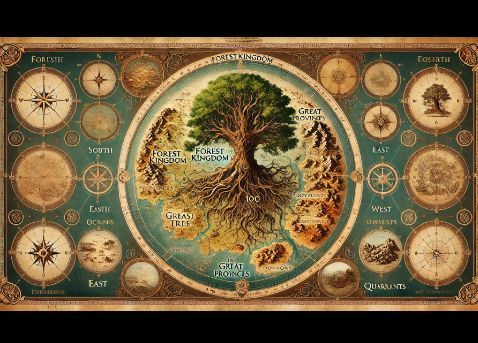
For the sectors and administrations of these realms, here’s a detailed layout based on their unique characteristics and thematic functions:

#TheeGreatTree and #TheeForestKingdom
Central Administration: The Council of Thee Rings, located within #TheeGreatTree, manages all provinces and quadrants.
Thee100Provinces: Each province has a localized administration led by a Caretaker or Guardian, handling cultural, natural, and mystical duties unique to each province.
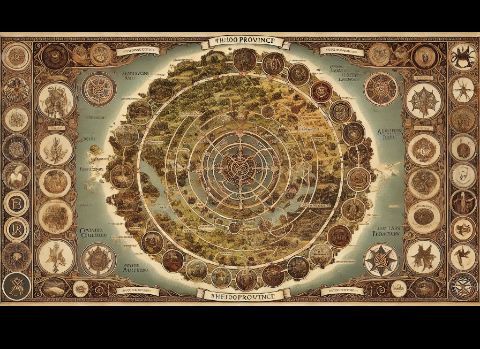
Provincial Districts:
Nature Districts: Forests, lakes, and sanctuaries with guardians preserving flora and fauna.
Enchanted Territories: Mystical areas governed by mages or healers who specialize in ancient spells and nature magic.
Trade Hubs: Designated areas for commerce, managed by trade ministers, where artisans and merchants converge.
#TheeFourQuadrants
Each quadrant has semi-autonomous governance, with specialized roles and purposes:
North Quadrant: Defensive stronghold led by Shieldmasters.
East Quadrant: Scholarly and knowledge-focused, governed by Lorekeepers who collect and archive ancient knowledge.
South Quadrant: Trade and economic center, managed by a council of Trade Ministers.
West Quadrant: Exploration and outer-world relations, led by Pathfinders.
The Underground Fai/Fei/Fairy Realms
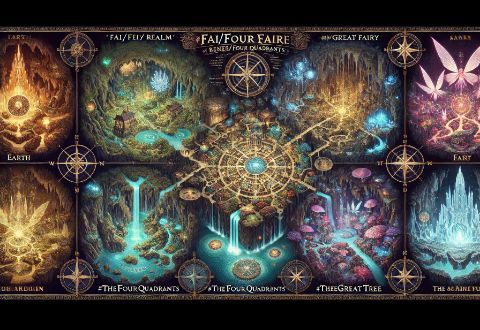
Central Court: The Fairy High Court beneath #TheeGreatTree functions as the ultimate governing body of all Fai/Fei realms.
Elemental Realms: Each realm is an independent state with a High Fairy or Elder presiding:
Earth Realm: Managed by the Stone Elders, focused on nurturing minerals and gems.
Water Realm: Ruled by the Tide Guardians, responsible for enchanted rivers and waters.
Fire Realm: Led by Flamekeepers, overseeing subterranean fires and lava flows.
Air Realm: Governed by Windwatchers, caretakers of tunnels filled with magical winds and currents.
100 Heavenly Realms and Castle in the Sky

Castle in the Sky: The divine administration palace housing the Celestial Order, which oversees the 100 Heavenly Realms.
Hierarchical Realms:
Celestial Circle: Directly under the Castle, managed by Angelics who ensure harmony.
Stellar Isles: Realms assigned to celestial guides and star-watchers, maintaining cosmic balance.
Divine Pathways: Pathways and bridges between realms are overseen by Pathwardens, who facilitate travel between the realms.
#TheeDarkGrandTreeOak and the 100 Circles of Hells
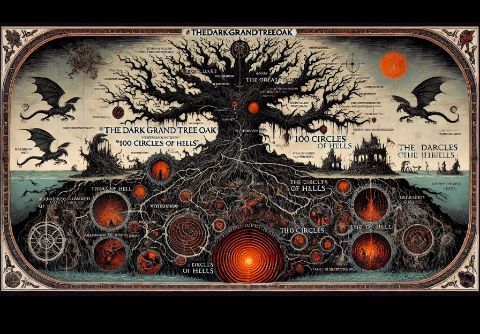
The Central Dark Court: Located within #TheeDarkGrandTreeOak, it is led by The Dark Tribunal.
Circles of Hells:
Each circle has its own overseer, titled as a Warden of the Dark, focusing on punishment or confinement.
Outer Circles: These are less harsh and focus on minor transgressions, governed by lower-ranking Wardens.
Inner Circles: The darkest regions, ruled by high-ranking Wardens with specialized powers.
Dark Harrowing Quadrants: Managed by Dreadlords, each quadrant hosts wicked and twisted beings under strict control.
Let me know if you’d like more specific details or enhancements for each sector! For linking data with Ai King, Copilot, and Garth AI, you may need a development setup that can integrate data structures. Let me know if you need additional guidance on that.
#Thee Forest kingdom#Thee100Provinces#Thee great tree#Thee four quadrants#TheeDarkGrandTreeOak#TheFaiRealms#TheheavenlyRealms#Heavenly Hierarchy#Disney kingdoms#Bambis kingdom#mousequteers#disneymanga#marvel#mouseclubmanga#disney#disneyaesthetics#enxanting#chanel
24 notes
·
View notes
Note
I am watching a video with criticism of geographical determinism in worldbuilding and realized that I don't really remember seeing any fictional stereotypic merchant state that relies on rivers.
Norse and Rus were whom I had in mind, but to my knowledge British and Japanese people also heavily utilized rivers for trade and I would be very surprised if Ancient Chinese people didn't.
I don't know about history of First Nations of North America and did they have trade in our understanding, but I heard that river system of North America is so convenient that the entire 19th century demand for transportation could have been covered by it alone, without trains.
Just some ideas
Freshwater systems are woefully underused in worldbuilding. The other day I was reading about the history of my region and I was amazed at how big and sophisticated native canoes were in the Paraná, the Paraguay and the Amazonas, and how virtually nobody talks about it. We are talking about ships that could hold about 30 people and some were bigger than Columbus caravels. For centuries into the colonial era, the Spanish and Portuguese hired or pressed into service native navigators for the rivers which were though to navigate as a sea. Still before that, they were the major arteries of commerce and trade through the continent, this is well known. Even Patagonian goods are reported in Corrientes (North of Argentina) which indicates that trade there got very far. As for the Chinese, not only rivers were important to the but also they boasted an amazing canal system but that's about all I know.
One thing I learned recently about rivers and cities is that cities were often founded on the side of rivers, yes, but almost never at their mouth. Look for example at Paris, Rome, London, the Egyptian capitals. They were founded by the river, but the mouth of the river next to the sea is where the delta is, and deltas always change and flood, carrying mud and slit, they aren't good places to build at all. Good river cities are built in the 'deep side' of the river where you can build ports, not in the side where sediment accumulates. Another issue with river cities are marshlands. For example, I remember reading that the marshlands of ancient Rome were drained at great cost. Ancient peoples knew that marshes were 'unsanitary' even if they didn't know why (it's because they host mosquitos and parasites, not because of anything bad wetlands have on itself) and they had to deal with them. There are some exceptions to this, like Venice which was basically built on a marshland (or the Netherlands).
And indeed rivers were (and still are! I see ships going up and down the Paraná every weekend!) a very efficient way of transportation. There's lots about it written in Europe, but river barges were basically the railroads of their time. Before the advent of railroads, people in Europe (and China) weren't thinking roads, but canals, the French built a lot of canals at great expense which became obsolete later by railroad.
Unfortunately the sources about river canoes and transportation in America (continent) are often tucked away in papers and history books, there really isn't that much accessible literature and illustrations about it. Which is a goddamn shame because learning about native canoes bigger than Spanish caravels (and they were still building them in Paraguay and Argentina during colonial times, according to my sources) blew my mind.
74 notes
·
View notes
Photo
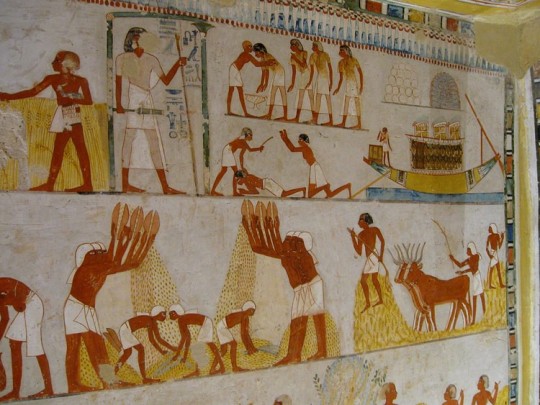
Jobs in Ancient Egypt
In ancient Egypt, the people sustained the government and the government reciprocated. Egypt had no cash economy until the coming of the Persians in 525 BCE. The people worked the land, the government collected the bounty and then distributed it back to the people according to their need and merit. Although there were many more glamorous jobs than farming, farmers were the backbone of the Egyptian economy and sustained everyone else. These farmers knew how to enjoy themselves, greeting the day as another opportunity to make the earth yield food, but looked forward to relaxation time at festivals because they worked so hard, so long, every day; but, in ancient Egypt, so did everyone else.
Egypt operated on a barter system up until the Persian invasion of 525 BCE and the economy was based on agriculture. The monetary unit of ancient Egypt was the deben which, according to historian James C. Thompson, "functioned much as the dollar does in North America today to let customers know the price of things, except that there was no deben coin" (Egyptian Economy, 1). A deben was "approximately 90 grams of copper; very expensive items could also be priced in debens of silver or gold with proportionate changes in value" (ibid). Thompson continues:
Since seventy-five litters of wheat cost one deben and a pair of sandals also cost one deben, it made perfect sense to the Egyptians that a pair of sandals could be purchased with a bag of wheat as easily as with a chunk of copper. Even if the sandal maker had more than enough wheat, she would happily accept it in payment because it could easily be exchanged for something else. The most common items used to make purchases were wheat, barley, and cooking or lamp oil, but in theory almost anything would do. (1)
Laborers were often paid in bread and beer, the staples of the Egyptian diet. If they wanted something else, they needed to be able to offer a skill or some product of value, as Thompson points out. Fortunately for the people, there were many needs which had to be met.
The Satire of the Trades
The commonplace items taken for granted today - a brush, a bowl, a cup - had to be made by hand. In order to have paper to write on, papyrus plants had to be harvested, processed, and distributed, laundry had to be washed by hand, clothing sewn, sandals made, and each of these jobs had their own rewards but also difficulties. Simply doing laundry could mean risking one's life. Laundry was washed by the banks of the Nile River which was home to crocodiles, snakes, and the occasional hippopotamus. The reed cutter, who harvested papyrus plants along the Nile, also had to face these same hazards daily.
These jobs were all held by those at the bottom of the Egyptian social hierarchy and are described in withering detail in a famous literary work from the Middle Kingdom of Egypt (2040-1782 BCE) known as The Satire of the Trades. This piece (also known as The Instructions of Dua-Khety) is a monologue in which a father, bringing his son to school, describes for the boy all of the difficult and nasty jobs which people have to do every day and compares these to the comfortable and rewarding life of the scribe. Although the piece is obviously satirical in its exaggerated depictions, the description of jobs and their difficulty is accurate.
The father characterizes the life of the carpenter as "miserable" and how the field hand on farms "cries out forever" while the weaver is "wretched" (Simpson, 434). The arrow maker wears himself out trying to gather raw materials and the merchant has to leave home with no guarantee of returning and finding his family intact. The washerman "launders at the riverbank in the vicinity of the crocodile" and his children want nothing to do with him because he is always covered in other people's filth. The fisherman is "more miserable than any other profession" because he must count on his good catch in a day to make a living and must also contend with the dangers in the water which often catch him unawares as "no one told him that a crocodile was standing there" and he is swiftly taken (Simpson, 435). All of these jobs are described in great detail in order to impress on the boy that he should embrace the life of the scribe, the greatest job one could have, as he tells his son:
It is to writings that you must set your mind. See for yourself, it saves one from work. Behold, there is nothing that surpasses writings!...I do not see an office to be compared with it, to which this maxim could relate: I shall make you love books more than your mother and I shall place their excellence before you. It is indeed greater than any office. There is nothing like it on earth. (Simpson, 432-433)
The writer of the Satire, obviously a scribe himself, may have exaggerated somewhat for effect but his argument is basically sound: the occupation of scribe was among the most comfortable in ancient Egypt and certainly compared favorably with most jobs.
Continue reading...
44 notes
·
View notes
Text
The Legend of the Princess Augusta or the Palatine Ship
The legend goes back to the historic shipwreck of the Princess Augusta at Block Island in 1738. The ship is known from several contemporary accounts and from statements made by the surviving crew after the sinking, which were discovered in 1925 and reprinted in 1939. The British merchant ship Augusta sailed from Rotterdam in August 1738 under Captain George Long and a crew of fourteen, carrying 240 immigrants to the English colonies in America. The passengers were German Palatines who came from the Palatinate, which is why the ship was referred to as the "Palatine Ship" in contemporary documents, which explains the later confusion about the name. The ship was on its way to Philadelphia, from where the passengers were possibly travelling to a German-owned settlement on the James River in Virginia.
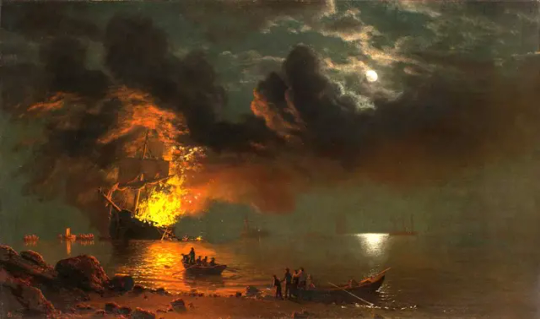
The Burning Ship, by Albert Bierstadt 1869
The Princess Augusta's voyage was ill-fated: The water supply was contaminated, causing a "fever and flux disease" that killed 200 passengers and half the crew, including Captain Long. First Officer Andrew Brook took command when severe storms forced the ship off course to the north, where the survivors were exposed to extreme weather conditions and dwindling supplies for three months. According to the crew, Brook forced the passengers to pay for the remaining rations. Apparently he tried different routes to Rhode Island and Philadelphia, but the storms drove the damaged and leaking Augusta to Block Island. She ran aground in a snowstorm at Sandy Point at the northernmost end of the island at 2 p.m. on 27 December 1738.
According to reports, Brook rowed to shore with the entire crew and abandoned the passengers on board. The Block Islanders apparently did what they could to help. They convinced Brook to let the passengers disembark the next day, and later retrieved their belongings when he left them on board. They also buried about 20 people who died after the shipwreck; the Block Island Historical Society erected a memorial plaque at the site of the "Palatine Graves" in 1947.
The authorities took statements from the crew, but what happened afterwards is unclear. Apparently the crew was not charged for their actions, and they and most of the surviving passengers made it to the mainland, from where little is known about them. Two survivors remained on Block Island and settled there. Most reports indicate that the ship was deemed unsalvageable and was forced out to sea to sink. It may have been set on fire to sink it. According to some reports, a woman, sometimes referred to as Mary Van Der Line, was driven mad by her suffering; she was forgotten and sank with the ship, according to these reports. However, no remains of the wreck have ever been found, and there are indications that the Augusta may have been repaired and sent on to Philadelphia.
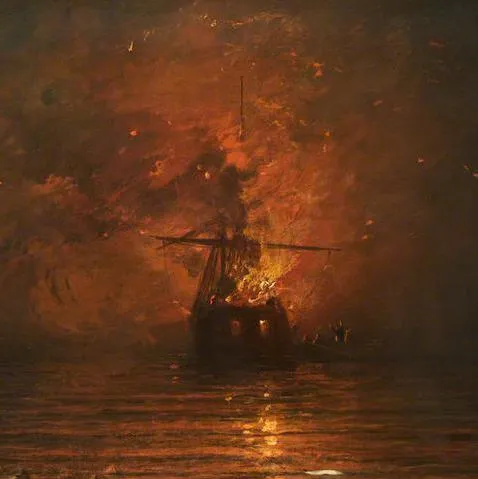
There is a rich oral tradition of this event, and numerous sightings were reported in the late 18th and 19th centuries. The legend was immortalised by the poet John Greenleaf Whittier in "The Palatine", which faithfully reproduces the traditional story in verse. Which gave the Legend it's name. On Saturdays between Christmas and New Year's Eve, locals still sporadically report seeing a burning ship pass by. Folklorist Michael Bell, investigating the legend, found that almost a year after the incident, two versions of the night's events were circulated.

The Palatine Graves
The Block Islanders insisted that their citizens had made a valiant attempt to rescue the crew, while the New England mainlanders suspected the islanders of having lured the ship to them in order to seize their cargo. Both legends agreed that a female passenger had refused to abandon ship when it sank, and those who claim to have witnessed her reappearance say that her screams were heard from the ship.
Today, a plaque at the Mohegan Bluffs where the ship is said to have run aground reads: Palatine Graves - 1738. Some claim that those who died that night are buried underground. However, Charlotte Taylor of the Rhode Island Historical Preservation and Heritage Commission has stated that no physical evidence has ever been found to support either this claim or the legend itself.
#naval history#naval mythology#princess augusta#palatine light#ghost ship#18th century#19th century#20th century#age of sail#age of steam
76 notes
·
View notes
Text
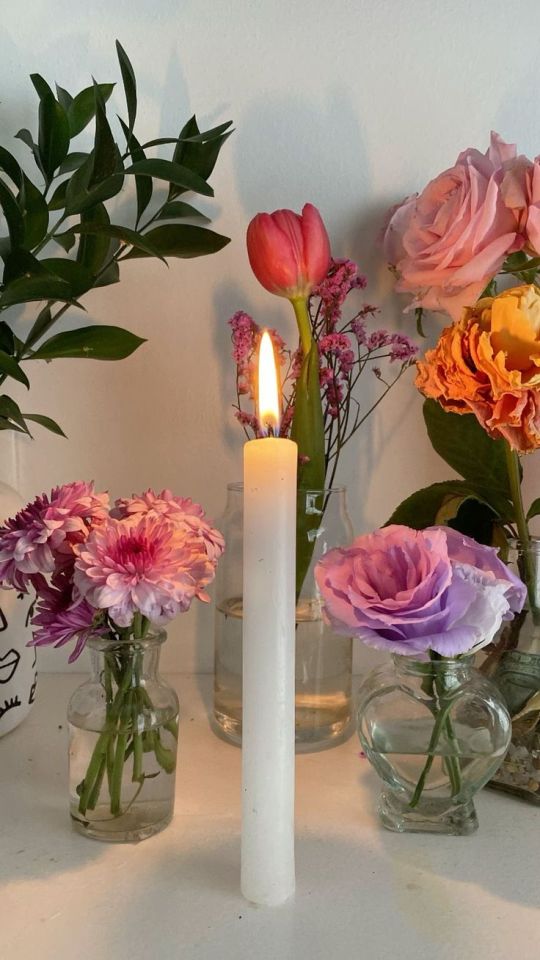
The History of Candle Magic in Hoodoo, American Folk Magic & Across the Globe.
Hey there, Venusian Dudes and Dolls! 🌟
Lately I've been obsessing over candle magic and how it's so important to a multitude of cultural practices. In modern magic many practitioners use candle rituals to hone our intent and hopefully manifest the energies we desire. Maybe it's the ADHD hyperfocus but this has always fascinated me. So today I'm taking you on a journey through the bright history of candle magic—a practice steeped in mysticism, transformation, and a universal yearning to connect with the divine.
Our story begins in the ancient world, where the first candles were more like rushlights—bundles of reeds soaked in animal fat, used in ancient Africa in Egypt around 3000 BCE. These early lights weren’t just practical; they carried symbolic weight, often illuminating temples and rituals that called on divine favor. The use of reed bundles soaked in animal fat began as a practical solution to meet the need for light after sunset. Reeds, abundant along the Nile River, were a natural and accessible resource, and animal fat was a byproduct of cooking or butchery. While reeds and animal fat were early components of lighting practices in ancient Egypt, they were not the sole origin of oil lamps.

The evolution of oil lamps was influenced by a combination of available materials, cultural ingenuity, and practical needs, leading to more sophisticated designs over time.
As Egypt was a hub of trade and culture, particularly during the height of the Pharaonic and later Ptolemaic eras, these lighting methods spread along trade routes. Merchants, travelers, and nomadic communities carried this technology to other parts of North and Sub-Saharan Africa and to other lands outside of Africa.
These Egyptian oil lamps, crafted from pottery, stone, or metal, featured a reservoir for oil—commonly castor oil, sesame oil, or animal fat—and a spout to hold a plant-fiber or papyrus wick. Oil lamps were integral to daily life, lighting homes, workplaces, and public spaces. Beyond their practical use, they held significant ritual importance, often used in temples and religious ceremonies to honor deities and ensure divine favor. The soft glow of these lamps was also believed to guide souls in the afterlife, with many placed in tombs as part of funerary rites. This duality of function—practical and spiritual—reflected the Egyptian emphasis on the interconnection between earthly existence and the divine.
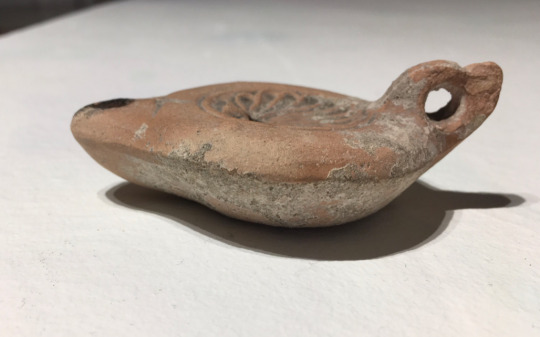

In ancient Rome, oil lamps evolved further, becoming more ornate and widely used. Romans preferred terracotta and bronze lamps, often featuring intricate designs or depictions of gods and myths. Olive oil was the most common fuel, symbolizing prosperity and abundance. Roman oil lamps illuminated homes, streets, and public baths, while their use in temples and during festivals underscored their religious significance. They also served as symbols of status, with wealthier individuals commissioning elaborate designs.

The Romans later perfected the art of candle-making with wax, creating the first dipped candles and creating objects of both daily use and sacred purpose. To these ancient peoples, the flame wasn’t merely light; it was life, a tiny sun held in the palm, connecting the earthly with the celestial.
As time flowed into the medieval era, candles found a deep and meaningful home in religious ceremonies. Catholicism and Christianity, in particular, adopted candles as symbols of divine light and spiritual purity. Every flicker in a darkened cathedrals and church became a prayer in itself, illuminating the path to salvation. The association of candles with prayer and intention became so ingrained that they naturally merged with the folk magic practiced in villages across Europe.


Here, we see some of the beginnings of candle magic as a personal, intimate practice. Villagers would light candles while uttering blessings, casting protections, or even weaving spells of love, fertility, or prosperity. The Renaissance added yet another layer to candle magic. The rebirth of Hermeticism and ceremonial magic brought a new understanding of how candles could be used to align with cosmic forces. Practitioners believed that the color of the wax, the timing of the flame, and the intention behind the lighting could channel planetary energies, summon spirits, or manifest desires. It’s no wonder that candles became indispensable in the practices of witches, alchemists, and mystics, serving as tools to focus will and amplify power.
Across the globe, candles begin to carry similar meanings. In Hindu traditions, oil lamps and candles were offered to deities as a gesture of devotion and to invoke blessings. In Afro-Caribbean practices, candles became central in rituals honoring ancestors and spirits, their light seen as a beacon guiding energies from the unseen world into the physical realm.
The History of Candle Magic in the Americas
The history of oil lamps and candles in America ties into the colonial and early settler experience. In the early 1600s, colonists brought tallow candles, made from animal fat, as their primary light source. These candles were smoky, smelly, and burned quickly, but they were accessible to all. By the 1700s, whale oil lamps became popular among wealthier settlers, producing a cleaner and brighter flame. However, enslaved and impoverished communities often relied on homemade tallow candles or simple oil lamps, repurposing whatever materials were available. The multicultural blending that defined American folk magic brought spiritual significance to these utilitarian objects.
In Hoodoo, a system of African American folk magic which is deeply multi-cultural and rooted in African, Indigenous, Judaistic and other practices, oil lamps and candles became potent tools for connecting with ancestors, spirits, and divine forces. Oil lamps were the original form of candle magic before the advent of electricity, and were longer lasting the candles. Hoodoo practitioners, often called rootworkers or conjure doctors, would craft oil lamps as magical devices by combining oils, herbs, minerals, and even personal items of the target (like hair or nails) inside the lamp. When lit, the flame was believed to activate the spell, drawing in spiritual assistance or amplifying the worker’s intention. These lamps were often made from everyday materials like mason jars or old lanterns, emphasizing the resourcefulness and ingenuity of Hoodoo practitioners in the face of oppression and scarcity.
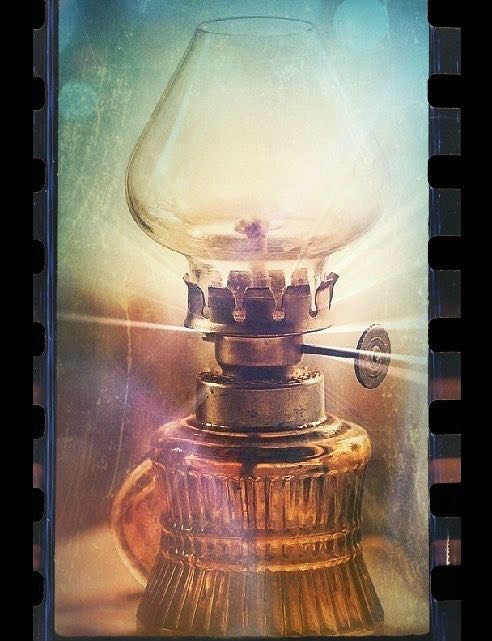
As time progressed, Hoodoo folk magic evolved with the times. Candles were introduced and now play a central role in Hoodoo. Each candle color carried a specific symbolic meaning: green for money, red for love, black for protection or banishing negativity, and white for purity and spiritual clarity. Practitioners would carve their intentions directly onto the candle or dress it with oils and herbs before lighting it. As the candle burned, its flame became a channel for prayer, intention, or communication with the spiritual world.
In Appalachian Granny magic, another eclectic and practical form of folk magic rooted in the mountains, candles and oil lamps were tools of necessity that took on a mystical role. The grannies, as these wise women were lovingly called, used candles and lamps in rituals of protection, healing, and divination. For example, a Granny might place a candle in a window to ward off spirits or guide a loved one safely home. They also believed in the "reading" of a candle’s flame or wax drippings, interpreting flickers, cracks, and shapes as signs or messages from the spiritual realm. Oil lamps were similarly revered in Appalachian folk magic. Often kept burning in the home, they symbolized the hearth and protection of the family. These lamps were sometimes used in protective magic, with certain oils or charms placed inside to keep malevolent forces away. If illness struck a household, the lamp’s light might be used as a focus for healing prayers or blessings.
The multicultural blending that defined American folk magic brought spiritual significance to these utilitarian objects. African enslaved people integrated their knowledge of oils, herbs, and spiritual practices into their use of lamps and candles. Meanwhile, European settlers added their traditions of candle-burning spells and charms. In Appalachia, the influence of Celtic, Germanic, and Native American traditions created a unique fusion of spiritual and practical uses for light.
By the 19th century, paraffin candles became widely available, offering a longer burn time and cleaner light. These advancements allowed magical practices to become more elaborate, with practitioners using candle wax readings or crafting intricate oil lamp spells.
Metaphysical Reason why Lamps & Candles Work in Ritual
The power of oil lamps and candles lies in their unique ability to combine all the elements. Both oil lamps and candles are transformational tools, combining the elements of fire (flame), earth (wax or oil), air (smoke), and spirit (intention). The flame is fire; the melting wax, oil, glass or clay base is earth; and the smoke it produces, air. This elemental balance makes candles perfect for spell work, because it seeks harmony between the practitioner and the universe. When a lamp or candle burns, it transforms solid oil or wax into smoke and heat, symbolizing the alchemical process of turning intention into reality. No wonder they’re seen as conduits for wishes, blessings, and change. Their light is seen as a direct link to the divine, symbolizing clarity, hope, and the power to transform one’s reality. Whether guiding spirits, warding off evil, or sending a prayer to the heavens, these lights illuminate more than the physical world— oil lamps and candle can light the path to magic itself.

So, the next time you light a candle for a spell, a wish, or even just to create a cozy vibe, remember that you’re tapping into a practice as old as time itself. From ancient Egyptian temples to your modern altar, candles have always been there, carrying our hopes and dreams skyward, one flicker at a time. Whether you’re burning a dressed candle in a conjure spell or lighting an oil lamp to protect your home, know that you are a part of a global lineage of witches, priests, magicians, grannies, and root workers who have used the power of flame to ignite change, protect the vulnerable, and honor the divine.
xoxo
Lyonessa
#hoodoo#paganism#ancient egypt#ancient rome#ancient greece#candle magic#pagan community#witches of color#baby witch tips#baby witch#history#witch content#witch community#haitianvodou#black femininity#conjure#rootwork#folk magic#african traditional religons#oil lamp#witchblr#beauty spells#spellcasting#spellcraft#witchcraft#spells#beginner witch#wicca#hoodoo heritage month#hoodoo community
17 notes
·
View notes
Text
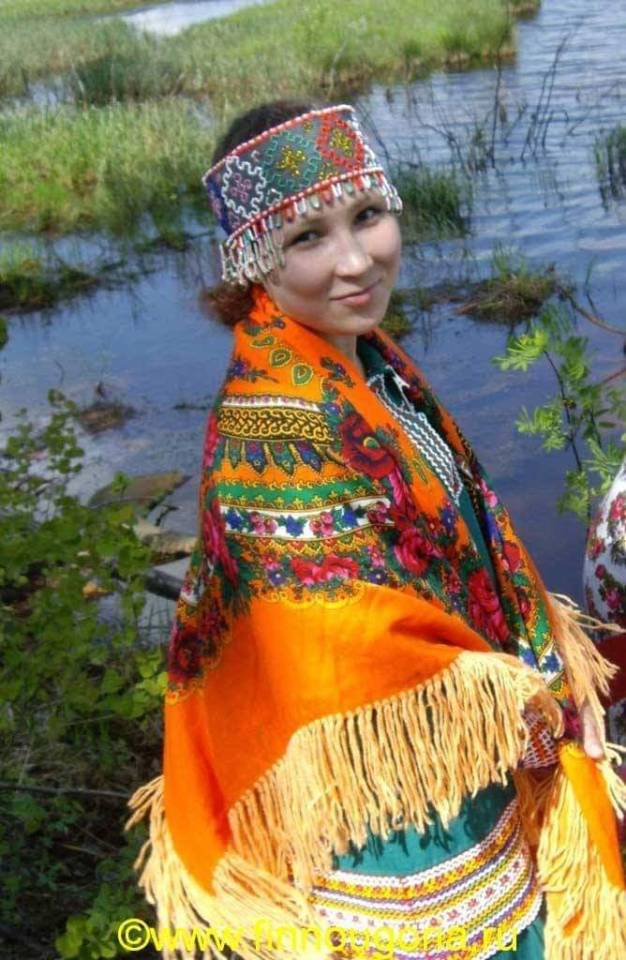
"Native smile from a Khanty girl,
Khanty Mansia, Northwest Siberia
The Khants are indigenous to north-west Siberia in the Khanty-Mansi and Yamal-Nenets Autonomous Districts that are located in the Tyumen region of the Russian Federation.
They are calling themselves Khanti, Khande, Kantek (Khanty) which is derived from the combination "Khondy-Kho" (in the Khant language "man from the river Konda") and it has also been explained as meaning "Khan (King) people" and connected with the name of the ancient Huns.
(Milittary expeditions by the Russians took place in the 16th century, so they also started to strengthen their power over the Khants' lands.
The Khant elders managed to retain their position and began to collect tribute from their subordinates. Gradual Christianization continued. The Khants have officially been regarded as 'Christians' since the year 1715 after the extensive baptisms of monk Fyodor. Nevertheless, the ancient spiritual belief of their forfathers ('shamanism') have persisted, even to this day.
The Khants were also economically subjugated. With the help of liquor the Khants were commercially exploited by Russian traders eager for cheap furs. The predatory policy of Russian merchants and officials was so efficient that by the end of the 19th century the Khants, harassed by economic difficulties, were broken and close to ruin. The colonizers had seized their best lands as well as their incomes, and had brought along dangerous diseases and destructive habits (liquor being the biggest curse). It was commonly thought that the Khants would survive for no more than a couple of decades...
The arrival of Soviet power was accompanied by great promises and expectations for the Khants and other northern peoples. In 1925 a Northern Committee was founded with the intention of leading the Khants, Mansis and Nenets along the road of progress. In 1930 the Ostyak-Vogul National District (renamed in 1940 the Khanty-Mansi National District) was formed. This new life was no less disturbing to the Khants, causing only fear and bewilderment. The establishment of collective farms followed accompanied by severe repressions. By attacking the traditions of the people the new ideology of communism incited the persecution of shamans and the destruction of sacred groves and burial grounds. Khant children were forcibly removed to boarding schools. The largest outburst of resistance, led by the elders, became known as the Kazym rebellion. The opposition was ferociously suppressed by the Soviet-Russian army;
Khant villages were burnt and much of that connected with the culture of the Khants was destroyed altogether. Cultural centres and 'red tents' were built to propagate the Soviet way of life and its accompanying customs. From then on, anyone who took part in the customary bear funeral rites could be subject to ten years' imprisonment. Bear hunting was also forbidden. (The Bear Celebration is being celebrated occasionally after a successful hunting of a bear. The bear celebration continues 5 or 6 days. Over 300 songs and performances occur during a Bear Celebration)
In the 1950s and 60s the Soviet-Russians discovered vast gas and oil reserves in western Siberia. The Khants, hardly recovered from the blows of communism, now found themselves at the mercy of technocrats. The piratic economy has been ruthless and greedy. Oil has polluted pastures and waters once filled with fish, the gas and oil lines have blocked the paths of the reindeer, wildfires have destroyed forests.
Still, every year 20,000--25,000 tons of oil pollutes the soil, spilled in technical failures (at least one accident every three days). 50 % of the natural gas is simply consumed in senseless burning brands. Industrial pollution reduces the fishing grounds by about 10,000 hectares every year. In the district of Nizhnevartovsk alone a fire destroyed 260,000 hectares of forest in 1989. At the same time there has been an explosive increase in population (mainly due to urban migration). In 1969, 289,000 inhabitants lived in the Khanty-Mansi Autonomous District, by 1979 the number of inhabitants was already 596,000 and in 1989, 1,268,000 (a growth of one million in 20 years). The frailty of the northern biosphere and its resources has been totally ignored.
The overwhelming pressures of industry and alien ways of life have cast doubt on the further existence of the Khants as a nation. As early as the 19th century, M. A. Castrén and K. F. Karjalainen were recommending that the Khants should be educated in a native spirit and in native surroundings, teaching them to respect their people and customs. In fact, the authorities have "developed and raised" the level of the Khant's economic and cultural life but taking into consideration only the authorities' own needs. This has deprived the Khants of any self-confidence of determination and furthered their decline.
Economic, cultural and linguistic discrimination of the Khants has taken the form of public harassment. They are referred to as dogs, and derisive remarks are made about their dark skin. They are not allowed to work in the mines in case "they break something" or "earn too much". The rapid regression in the living conditions of the Khants is reflected in the decline of industry and in heavy drinking which has an all too common tendency to lead to suicide...)"
#indigenous#culture#important#indigenous russia#indigenous russian#fypシ#fypage#russia#colonization#landback#land back#native siberia#siberian indigenous#indigenous siberian#siberian#Siberia#khanty#native people#native rights#native#natives#indigenous rights#indigenous people
24 notes
·
View notes
Note
Do you have anything already set or thought out for sea-travel in the setting? Is it common, kept mostly in coastal regions or are longer voyages on larger vessels also a thing? Bonus question, and I know that it may be difficult inland especially during a drought, but can any of the characters of the white calf story swim (well or poorly)?
Yeah the majority of interconnected world powers rely on sea trade
The core continental mass in this world is about the combined size of Eurasia + Africa (though laid out very differently (sorry for still no map)) but much of its central-eastern interior is divided by a network of seaways formed by the movements of the continents (picture the Mediterranean - Red Sea but More) on which the majority of travel and trade relies. Other tradeways exist in the open ocean, though mostly close to the coasts and mostly routes to and from the entrances to the Inner Seaways.
Most long distance merchant ships will rely exclusively on sailing, without rowers. I don't really have exact sizes for common merchant ships pinned down, but it's not going to surpass the size of anything widely used in the 'ancient world' (certainly smaller than the biggest found in ancient Rome, as there is no single world power here big enough to necessitate that much imported grain to sustain itself).
Broadly speaking, there are VERY few voyages performed out into the open ocean, outside of fishing/'whaling' ventures and journeys to known inhabited islands connected via trade. As far as the vast majority of peoples know, there's nothing of much interest out there- a continent in the far north is known by most seafaring peoples but is rarely interacted with, and another exists on pretty much the opposite side of the globe from everything else and is virtually unknown (has caelin peoples as its sole sophont inhabitants, dispersed by flight).
Few people have reason to travel great distance outside of the context of trade. Long distance immigration is rare (with the exception of caelin peoples, again due to flight), the vast majority of mass movements of people are done on smaller distance scales or via gradual dispersal, the furthest common travel distances still being relatively close along sea routes.
Like as an example: Imperial Wardin's ethnic makeup (in terms of established populations) is: Wardi (themselves a collection of dozens of tribes largely assimilated into a national identity), Wogan, Cholemdinae, Jazait, the Hill Tribes (<<< all these are native to the region for at least a millenia), Burri, Titen, Kos (contemporary immigrants, or descendants of Imperial Burri occupiers, originating from across a narrow sea to the west), Yuroma, Ummo, Yanti (people from the coastal Lowlands just to the southeast along the White Sea), Ulelilwa (a people from the largest island chain in the White Sea, to the southwest) South Finns, Askosh, Ubiyans (some people from around the Viper seaway). There's a great variety of people here, but those that exist in significant established populations stem from around the three seas that directly border the region.
AS FOR SWIMMING:
Tigran isn't a strong swimmer per se but he's good at holding his breath and floating around, he grew up next to a river and would play in it as a kid. Doesn't have many opportunities to swim these days but likes being around water.
Brakul is a pretty strong swimmer, also grew up around rivers and learned to swim at a young age and enjoys it. He fails at a piss-drunk attempt to drown himself at one point because his treading water and floating instincts kick in (though moreso because the water is like 2 ft deep and mostly mud)
Etsushir is a VERY strong swimmer, most Jazait practicing traditional subsistence methods are taught to swim from a very young age, and he spent most of his life as a fisherman and several years specifically as a pearl diver.
Faiza made a conscious choice to learn to swim and sometimes would swim in the sea as a pastime back home. She loves the ocean and is a very strong swimmer, will go out much farther than would be considered safe or recommended.
Palo avoids open bodies of water (with sunlight sparkling on water one of the very few specific seizure triggers he can identify) and is also too skinny to float effectively, probably could not swim.
Hibrides finds bodies of water that you can't see the bottom of gross and creepy and avoids even touching them, much less swimming. Definitely can't.
Janeys hates being wet in anything harsher than a warm bath and would die on contact before he could even get around to death by drowning.
Couya is under the impression that if she ever had to swim she would simply Know How, but definitely wouldn't.
32 notes
·
View notes
Text
Day 1
The Embrace
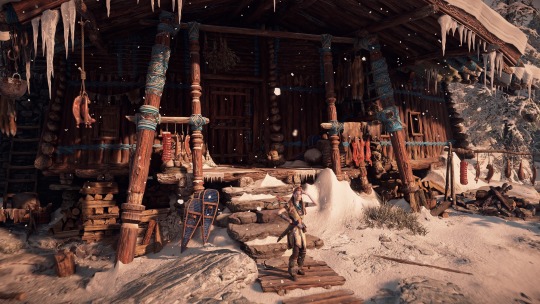
Two days before the proving. Rost wants to go hunting today. I’ll enjoy his final lessons. Things will change after the proving, but I’ve got a plan for that.
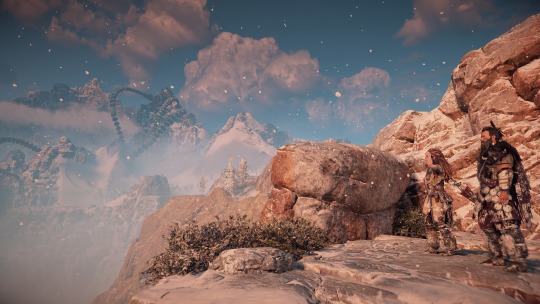
Tasks for the day: hunting game for Grata, shards and blaze for fire arrows. Rost has something planned.
Ended up taking out the whole herd for practice, along with gathering the supplies Rost wanted. Took a nasty fall off a rock, hit by a Watcher blast. Blinded too. Amateur mistake.
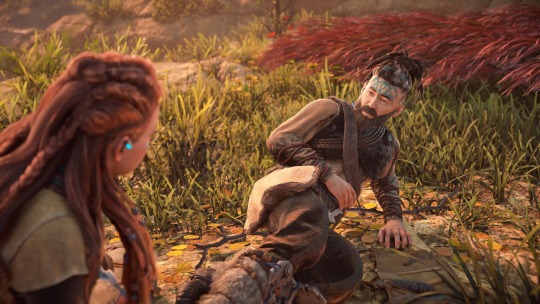

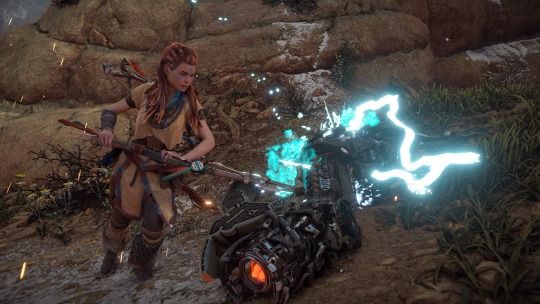
Met a wounded man who wanted help from anyone, even an outcast. His daughter was lost and he was stuck there feeling sorry for himself, unable to pursue her. I tracked his daughter, Arana. She was stuck up on a Brave trail circled by Watchers. I took out all 4 without them seeing me. Sort of.
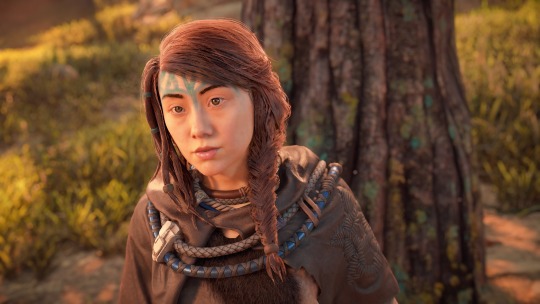
Arana told me she'd lost her late mother's spear in a tousle with a Scrapper. If she can't handle a few Watchers, Scrappers are out of the question. So she would return to her father, I said I'd get the spear back for her.
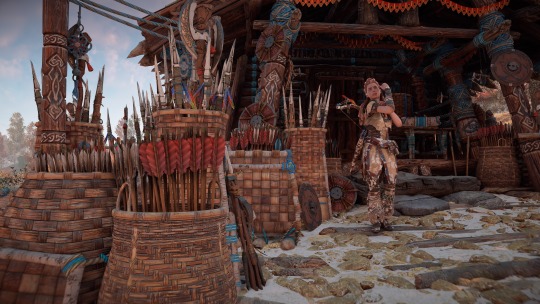
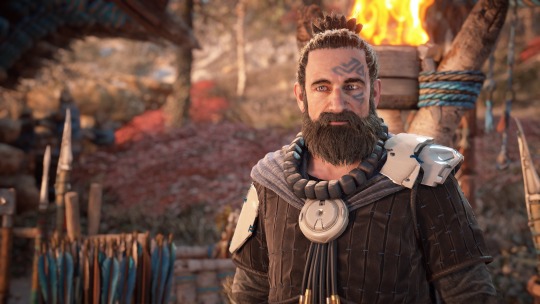
Bought a Tripcaster off Karst, finally. He was worried I'd leave him for merchants in Mother's Heart once I won the Proving, maybe turn him in too. Honestly, how could he think so little of me? I'm the last person that would go running to the Matriachs to complain about a few trespasses of tribal law. I'm a loyal customer too. I'll charge more for my trades once I'm a Brave, though. I have a suspicion he's been underpaying me because he knows I have no one else who'll trade with an outcast.
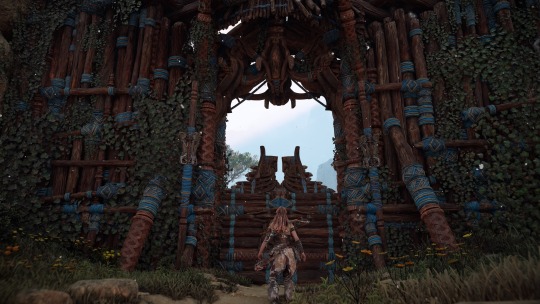
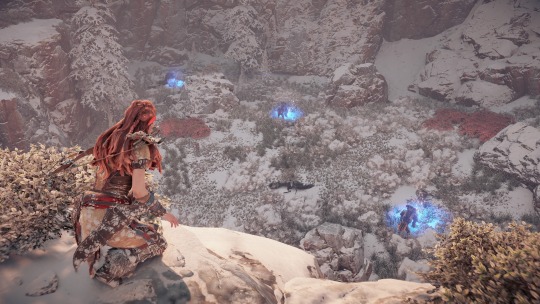
Got Arana’s spear back from a Scrapper. It took a long time to track, I had to cross most of the Embrace to find it. Managed to tease it away from the herd and take it out mostly from a distance. When I returned to them with the spear, she and her father were kind to me. It was…different, but nice. Thok, once I got him standing again, even helped make some structural improvements to my spear based on his mate's design.
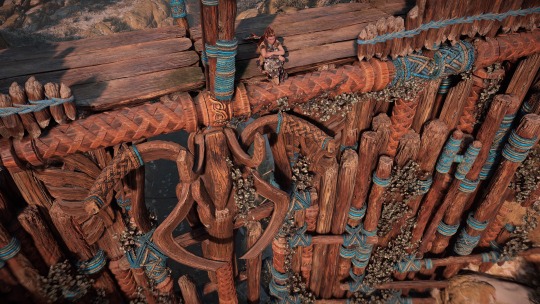
Walked back along the bridge by the southern gate in full view of the guards and towers. Soon they won’t scorn me. Call it savouring their bitterness for the last time. The view is as beautiful as ever. The river goes on further than I can see.

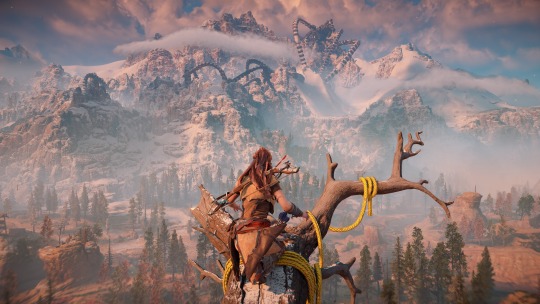
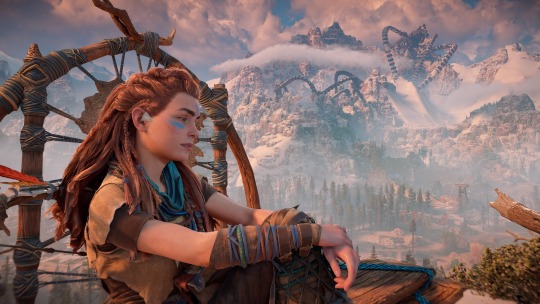
Climbed the rock trail the fast way and got Grata’s prayer beads for her. No idea how she made it up there to begin with. Rested there a while.
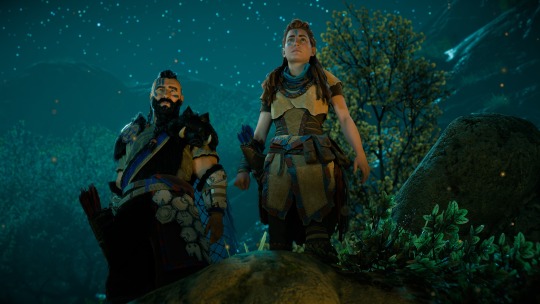
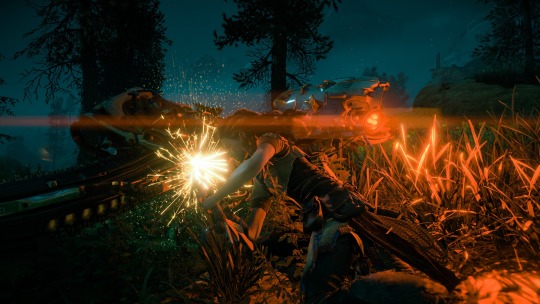
Met Rost at the north gate and tried to sleep until dark. He seemed even less keen than usual on talking. I tried to bring up my plan for us to stay in contact once I was made a Brave. He could stay his silent, devout self while I could come to him and speak, completely one-sided. My crime only. He didn't want to listen. Doesn't matter. I'll keep bothering him whether he likes it or not.
Beyond the Embrace for the first time to hunt a machine called a Sawtooth, twice the size of a Strider and ten times as fierce, rending claws, like an oversized scraper. The huge blaze canister on its belly made an easy target, and I put my Tripcaster to good use bringing it down to shock. Good haul from the carcass. With all the fire and ruin, you’d have thought there were a stampede of the things. Apparently there were only three. I got the last one.
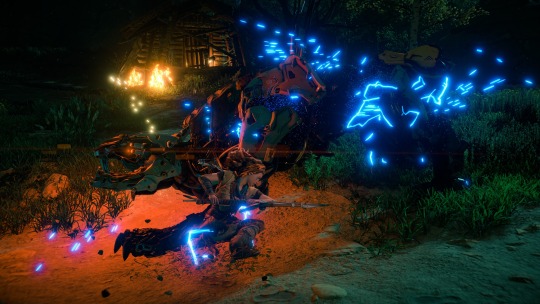
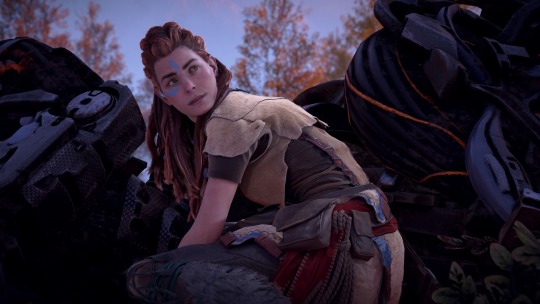
The tribe owe me one already. Maybe Rost is right, and they’ll need me, even be grateful to me after all this time. I don’t know if I can accept that. I haven’t really thought about what I’ll do once I know the truth about my mother. That’s what all of this has been for. Happiness beyond that? Maybe. As long as Rost is here, if silent, and the wilds continue to surprise.
17 notes
·
View notes
Text
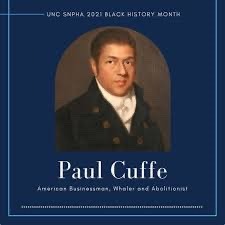
Paul Cuffe (January 17, 1759 – September 7, 1817) was born free into a Native American, African American family on Cuttyhunk Island, MA. He became a successful businessman, merchant, sea captain, whaling captain, and Abolitionist.
He and his older brother, John, inherited the family farm. The following year he signed on to the first of three whaling voyages to the West Indies. He delivered urgently needed goods to the people of Nantucket by slipping through a British Naval blockade on a small sailboat. He built a lucrative shipping business along the Atlantic Coast and in other parts of the world. He built his ships in a boatyard on the Westport River. He established in Westport the first racially integrated school in North America.
He joined the Westport Friends Meeting and often spoke at the Sunday services at the Westport Meeting House and other Quaker meetings in Philadelphia. He oversaw the construction and donated half the money for a new meeting house in Westport that exists to this day. Very few people of color were admitted to the Friends Meeting.
He became involved in the British effort to develop a colony in Sierra Leone, to which the British had transported many former slaves from America. Some were slaves who had sought refuge and freedom with British military units during the war. After the British were defeated, they took freed enslaved first to Nova Scotia and to Sierra Leone where they were settled in the new colony. He sailed to Sierra Leone to learn what the conditions of these settlers were and whether he could help them. He concluded that efforts should be made to increase local production of exportable commodities and develop their shipping capabilities rather than continuing to export enslaved. He opposed the Back to Africa movement and saw his efforts very differently as assisting the people of Africa. #africanhistory365 #africanexcellence
8 notes
·
View notes